Tuesday, February 10, 2009
Finally starting to pack for the Left Coast trip. Hope the plane gets out in the 50 MPH winds tomorrow.
Read the full post here ...
Monday, February 02, 2009
Talked too much and listened too little. Got carried away by common interests, and forgot to shut up.
Read the full post here ...
Monday, January 26, 2009
"Intro" to a couple of developers I've only known over the phone for 3 years! Great to put faces w/ names.
Read the full post here ...
Wednesday, December 31, 2008
Late nominee for Woman of the Year 2008. I want to adopt her as my honorary Nana.
http://ping.fm/IaATy Read the full post here ...
http://ping.fm/IaATy Read the full post here ...
Saturday, November 04, 2006
Thailand Bails on OLPC (now known simply as "XO")
Well, apparently the new military-led government in Thailand has a thing about cheap computers. Or, at least it would seem that way. The Thai government, according to sources there, has backed out of a deal to buy a million of the OLPC Project's lappies. The information minister has derided the project as a "toy," and they've called off the whole deal.
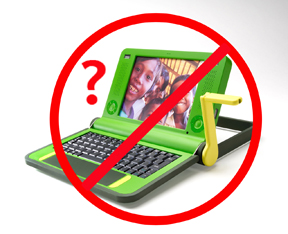
This as the first 50 real, live units ship out to Brazil for testing in the wild. Way to kill the buzz, Thailand! Sheesh!
And lest we go two months without another alphabet-soup moniker to throw around, Negroponte's gang has rechristened their machine the XO. It's all, like, totally huggy-kissy and all, but like, c'mon, dudes ... we were just getting used to calling it "2B1," and now you go and change and we have to get all new keywords and labels and search engine tags and whatnot. Read the full post here ...

This as the first 50 real, live units ship out to Brazil for testing in the wild. Way to kill the buzz, Thailand! Sheesh!
And lest we go two months without another alphabet-soup moniker to throw around, Negroponte's gang has rechristened their machine the XO. It's all, like, totally huggy-kissy and all, but like, c'mon, dudes ... we were just getting used to calling it "2B1," and now you go and change and we have to get all new keywords and labels and search engine tags and whatnot. Read the full post here ...
Classmate PC Gets (Almost) Real
Those of you scoring at home can add a tally mark to the until-now-empty Intel column on the scorecard of low-cost, third-world-loving computers. The Classmate PC, which can be had for the price of three units from that other organization, has finally got some specs.

Firstly, lest we think the developing world will be completely Micro$uck-free in the oh-so-connected future, the Classmate will be sporting everybody's FAVE OS, Windows XP. (There's a third of the $400 price tag, right there!)
To power that resource-loving XP, the Classmate will carry a whopping 256MB DDR2 RAM (can you even boot XP past a Blue Screen Of Death with that?), a single lonely GB of NAND flash storage, a 7" display at 800x400, and a 6-cell lithium-ion battery (Sony? Wait, do we smell smoke??). Oddly, the Classmate d33t5 FROM INTEL fail to mention a processor. What up with that?
Anyway, you can get your Classmate on in the Spring of 2007, allegedly. For those developing nations who will eschew the open-source OLPC, the Classmate will be the, uh, not exactly "Cadillac," but probably a (small) step up from the hand-crank love. Cool, huh?
Photo credit: Ricardo's Blog, at (oddly enough) www.ricardosblog.com. Read the full post here ...

Firstly, lest we think the developing world will be completely Micro$uck-free in the oh-so-connected future, the Classmate will be sporting everybody's FAVE OS, Windows XP. (There's a third of the $400 price tag, right there!)
To power that resource-loving XP, the Classmate will carry a whopping 256MB DDR2 RAM (can you even boot XP past a Blue Screen Of Death with that?), a single lonely GB of NAND flash storage, a 7" display at 800x400, and a 6-cell lithium-ion battery (Sony? Wait, do we smell smoke??). Oddly, the Classmate d33t5 FROM INTEL fail to mention a processor. What up with that?
Anyway, you can get your Classmate on in the Spring of 2007, allegedly. For those developing nations who will eschew the open-source OLPC, the Classmate will be the, uh, not exactly "Cadillac," but probably a (small) step up from the hand-crank love. Cool, huh?
Photo credit: Ricardo's Blog, at (oddly enough) www.ricardosblog.com. Read the full post here ...
Sunday, October 22, 2006
Education Tools for iPod
A company called Talking Panda has come up with what appears to be a neat little Mac application (sorry, Windows users!) that lets you build "study tools" that can be replayed on an iPod. Details are a bit sketchy, but from the product writeup it appears that teachers would use iWriter to create combinations of text, audio, and even video that is specifically formatted for replay on the iPod display. For students without the indispensible and ubiquitous little wonder, the files can also be uploaded to .Mac or to a teacher's website for use on a Windows machine.

Templates provided include syllabi for college and high school, lecture notes, multimedia presentation, "ESL Listen and Learn," and "radio show." As you create your project, you can click a button to see how it will appear on an iPod, making sure your ideas translate to the small screen. You can attach audio to your lecture notes, so you can "illustrate" your lecture notes rather than just provide an audio version of your lecture. You can also link to the audio of the lecture, though, so you can provide both. But hey, why not have both?? iWriter lets you build multi-page projects, similar to building a multi-page website, and then you can upload to .Mac, or even use the final project as a website of sorts, by posting the pages to your class site.
Talking Panda doesn't disclose pricing or let you download a demo without providing an e-mail address (shame on them!) but at least they promise not to sell your d33ts to someone else. The software is only $30, but you can try it free for 15 days. Cool, huh? Read the full post here ...

Templates provided include syllabi for college and high school, lecture notes, multimedia presentation, "ESL Listen and Learn," and "radio show." As you create your project, you can click a button to see how it will appear on an iPod, making sure your ideas translate to the small screen. You can attach audio to your lecture notes, so you can "illustrate" your lecture notes rather than just provide an audio version of your lecture. You can also link to the audio of the lecture, though, so you can provide both. But hey, why not have both?? iWriter lets you build multi-page projects, similar to building a multi-page website, and then you can upload to .Mac, or even use the final project as a website of sorts, by posting the pages to your class site.
Talking Panda doesn't disclose pricing or let you download a demo without providing an e-mail address (shame on them!) but at least they promise not to sell your d33ts to someone else. The software is only $30, but you can try it free for 15 days. Cool, huh? Read the full post here ...
Saturday, October 21, 2006
Univ. of Arizona and IBM to Unleash Web 2.0
Web 2.0 is coming to the classroom at Arizona University, and, eventually, to Global 1,000 businesses. The new program, for MIS and Marketing students, is designed to attract and train students in Web 2.0 technologies, and how they can be applied to business in the 21st century.

Wikis, blogs, social networking, tagging, and other popular technologies are destined not just to impact businesses, but to attract students to an MIS program with dwindling enrollment. By one estimate, enrollment in computer science programs is down a whopping 32% nationwide over the last four years. AU and Big Blue intend to reverse the trend, in part by offering a curriculum steeped in technologies the kiddies are already using online. The logic goes something like this: "the kids dig this stuff on their favorite sties; let's teach 'em how to build it and put some butts in the seats."
Of course, the ultimate effect on modern business remains to be seen. While companies such as YouTube (now GooTube), MySpace, and Digg show explosive growth in traffic, they have yet to establish clear monetization models. Perhaps the Econ department at AU should look at this program as well, offering tips not just in how to build Web 2.0 tools, but how to leverage them and make money.
The program at AU will probably be one of many efforts to build MIS enrollment across the country, but the partnership with IBM may well give it a technical and financial foundation that bodes well for success.
Cool, huh? Read the full post here ...

Wikis, blogs, social networking, tagging, and other popular technologies are destined not just to impact businesses, but to attract students to an MIS program with dwindling enrollment. By one estimate, enrollment in computer science programs is down a whopping 32% nationwide over the last four years. AU and Big Blue intend to reverse the trend, in part by offering a curriculum steeped in technologies the kiddies are already using online. The logic goes something like this: "the kids dig this stuff on their favorite sties; let's teach 'em how to build it and put some butts in the seats."
Of course, the ultimate effect on modern business remains to be seen. While companies such as YouTube (now GooTube), MySpace, and Digg show explosive growth in traffic, they have yet to establish clear monetization models. Perhaps the Econ department at AU should look at this program as well, offering tips not just in how to build Web 2.0 tools, but how to leverage them and make money.
The program at AU will probably be one of many efforts to build MIS enrollment across the country, but the partnership with IBM may well give it a technical and financial foundation that bodes well for success.
Cool, huh? Read the full post here ...
Tuesday, October 17, 2006
Want to Learn Something Cool?
If you've been following Google's new offering, still in Beta, of Blogger.com, you may already have found "Want to Learn Something Cool?" But just in case, it's worth a quick post here.
Want to Learn Something Cool is, for the moment, a mirror of Want to Know Something Cool. That is, the posts are identical, though the design is a bit different. Why two blogs, you wonder? Well, the new version that's still in Beta offers post tagging-- a handy way to throw a few keywords against each post, theoretically making it easier to find the posts of most relevance to a given reader.
So while it's in Beta, we're running Want to Learn Something Cool over there, with the same posts that appear here, where you've (hopefully) set your bookmark. Eventually, the post tagging option will find its' way from Beta to general release, and theoretically we won't need two blogs anymore. But for now, we're running parallel blogs to try out the new toolsets from Google. This is just a heads-up that Learn Something Cool is out there; we'll still publish here for the foreseeable future. If you check it out and find you have a preference, by all means, post a comment to either place and let us know what you like (or don't) about the new blog. Thanks for reading! Read the full post here ...
Want to Learn Something Cool is, for the moment, a mirror of Want to Know Something Cool. That is, the posts are identical, though the design is a bit different. Why two blogs, you wonder? Well, the new version that's still in Beta offers post tagging-- a handy way to throw a few keywords against each post, theoretically making it easier to find the posts of most relevance to a given reader.
So while it's in Beta, we're running Want to Learn Something Cool over there, with the same posts that appear here, where you've (hopefully) set your bookmark. Eventually, the post tagging option will find its' way from Beta to general release, and theoretically we won't need two blogs anymore. But for now, we're running parallel blogs to try out the new toolsets from Google. This is just a heads-up that Learn Something Cool is out there; we'll still publish here for the foreseeable future. If you check it out and find you have a preference, by all means, post a comment to either place and let us know what you like (or don't) about the new blog. Thanks for reading! Read the full post here ...
Monday, October 16, 2006
Bully to be Set Loose on the World Tomorrow
Note To Self, October 17th: Wear wedgie-proof undies.
"Bully," the controversial T-rated videogame, has been greenlighted for release by Florida Judge Ronald Friedman. Rockstar Games, home of the not-for-the-fainthearted Grand Theft Auto series, will release the game October 17th as planned.

The Judge's ruling comes with a caveat, however: he will delay ruling on whether "Bully" constitutes a "public nuisance" until after the game is released. So while he has not held up publication, he has reserved judgment.
The case was brought to court by one Jack Thompson, a lawyer named by the BBC as "a well-known campaigner against what he believes are violent video games."
"Bully" has graced the pages of Want to Know Something Cool? before (here and here), when the case first garnered publicity. Public reaction was, uh, quiet.
In the game, the player takes the role of a kid who is potentially bullied by "bad guys," and needs to avoid being pummeled for lunch money while forming alliances with various cliques in the school population, who, presumably, are also going to torment, taunt, and give swirlies. It should be noted that the player of the game does NOT take on the role of bullying other characters.
In his ruling, which essentially deferred a ruling, Judge Friedman said, "There's a lot of violence. A whole lot. [But] Less than we see on television every night."
What's he watching, do you think? (Besides CSI: Miami?) Read the full post here ...
"Bully," the controversial T-rated videogame, has been greenlighted for release by Florida Judge Ronald Friedman. Rockstar Games, home of the not-for-the-fainthearted Grand Theft Auto series, will release the game October 17th as planned.

The Judge's ruling comes with a caveat, however: he will delay ruling on whether "Bully" constitutes a "public nuisance" until after the game is released. So while he has not held up publication, he has reserved judgment.
The case was brought to court by one Jack Thompson, a lawyer named by the BBC as "a well-known campaigner against what he believes are violent video games."
"Bully" has graced the pages of Want to Know Something Cool? before (here and here), when the case first garnered publicity. Public reaction was, uh, quiet.
In the game, the player takes the role of a kid who is potentially bullied by "bad guys," and needs to avoid being pummeled for lunch money while forming alliances with various cliques in the school population, who, presumably, are also going to torment, taunt, and give swirlies. It should be noted that the player of the game does NOT take on the role of bullying other characters.
In his ruling, which essentially deferred a ruling, Judge Friedman said, "There's a lot of violence. A whole lot. [But] Less than we see on television every night."
What's he watching, do you think? (Besides CSI: Miami?) Read the full post here ...
Sunday, October 15, 2006
More From Google on Classroom Potential
A recent post to the Official Google Blog spells out a bit more about how Google wants to integrate itself into the classroom workaday. From Writely and Google Spreadsheets to 3-D rendering to historical information and news, Google clearly aims to make itself *the* go-to resource for students and teachers. And hey, maybe that's not such a bad thing. After all, there are plenty of great tools and services available through the Mighty G, and while they're not the only game in town, they've done a pretty darn good job with the tools and services they've developed.

And according to analysts, Google has recently shifted focus, from a "build" mentality to an "integrate" mindset. This means that Google services will be increasingly seamless and mashups will make them easier to use and closer to the point of use.
Sure, there's Ask and Yahoo! and MSN for search, and Accuweather, and the websites of various libraries and museums, and there are other word processors and spreadsheet applications, other ways to get things done. But increasingly, Google is putting itself in the closest proximity to actual point-of-use. The breadth of services continues to grow, but their johnny-on-the-spot pervasiveness may be what gives Google the edge, as a one-stop shop for myriad mash-ups and tools and services that can enrich, engage, and enlighten. On the other hand, critics worry that making one vendor too central to the academic process can lead to dependence and narrow-mindedness.
Wherever you fall on the debate, there's no denying that there are lots of ways that Google can "play" in education. Whether or not they're accepted, and implemented, by teachers, remains to be seen. Read the full post here ...

And according to analysts, Google has recently shifted focus, from a "build" mentality to an "integrate" mindset. This means that Google services will be increasingly seamless and mashups will make them easier to use and closer to the point of use.
Sure, there's Ask and Yahoo! and MSN for search, and Accuweather, and the websites of various libraries and museums, and there are other word processors and spreadsheet applications, other ways to get things done. But increasingly, Google is putting itself in the closest proximity to actual point-of-use. The breadth of services continues to grow, but their johnny-on-the-spot pervasiveness may be what gives Google the edge, as a one-stop shop for myriad mash-ups and tools and services that can enrich, engage, and enlighten. On the other hand, critics worry that making one vendor too central to the academic process can lead to dependence and narrow-mindedness.
Wherever you fall on the debate, there's no denying that there are lots of ways that Google can "play" in education. Whether or not they're accepted, and implemented, by teachers, remains to be seen. Read the full post here ...
College Students Go Phishing More Than You'd Think
According to a study conducted by Indiana University at Bloomington, college students are not quite as safety-savvy as we'd like to believe. In fact, an alarming number of students fell for a "benevolent" (for research only) phishing scam conducted by the university.

According to the Gartner Group, about 5% of US adults are successfully scammed by a phishing scheme, with "successful" being defined as ultimately releasing personal information to a bogus site or organization.
Using a common scam, the Hoosier researchers sent unsolicited e-mail messages purporting to be from eBay. They prompted students to "verify their account information;" and a startling 14% of them actually submitted personal information to the website linked from the e-mail ... which was at IU, not eBay. The complete study is available as a PDF at this link (NOTE: DIRECT DOWNLOAD LINK), and runs a manageable 10 pages.
The upshot doesn't take ten pages, though: Students need to be better-educated about online scams and safety on the interwebs. It's high time somebody-- maybe an army of Google-certified teachers?-- builds technological safety into the basic "intro to computers" curriculum offered at the lower grades, and that they refresh that instruction every year. Read the full post here ...

According to the Gartner Group, about 5% of US adults are successfully scammed by a phishing scheme, with "successful" being defined as ultimately releasing personal information to a bogus site or organization.
Using a common scam, the Hoosier researchers sent unsolicited e-mail messages purporting to be from eBay. They prompted students to "verify their account information;" and a startling 14% of them actually submitted personal information to the website linked from the e-mail ... which was at IU, not eBay. The complete study is available as a PDF at this link (NOTE: DIRECT DOWNLOAD LINK), and runs a manageable 10 pages.
The upshot doesn't take ten pages, though: Students need to be better-educated about online scams and safety on the interwebs. It's high time somebody-- maybe an army of Google-certified teachers?-- builds technological safety into the basic "intro to computers" curriculum offered at the lower grades, and that they refresh that instruction every year. Read the full post here ...
STAReBOOK Reader Joins the Crowd
Not content to let Sony and Panasonic hog the limelight, the internationall renowned STAReBOOK (?) of China is release the aptly named STAReBOOK, with two models for China and one for the U.S. of A. A six-inch e-ink display, made by PVI, is the same as that of the Sony product, and overall the STAReBOOK (it's such a catchy name) is a svelte 7.4" by 4.65" by a lean .33" thick, and weighs in at a manageable half-pound (8.9 ounces, to be exact).

The STAReBOOK (you just can't stop saying it) uses a proprietary eBook format (known as STK) but is apparently built to accept-- and maybe even convert?-- other types of files, as it has a built-in mono speaker in the back, an SD slot, a headphone jack, and USB 2.0, so there's probably some media formats that will play/display on the unit. It sports a 250MHz Samsung processor and 64MB of SDRAM.
Priced higher than the Sony and Panny jobs at $440, the STAReBOOK (OK, last time) isn't going to win on price alone, but given Sony's "overwhelming demand" issues, it will probably be available sooner. And based on what we can read from the translation on the MobileRead Network, it's probably worth a look, if only as a point of comparison with the Sony and Panasonic products. There's no telling the build quality or reliability of such a, ahem, "well-known" company, but it appears to be using reputable components, so it may be worth a second look. And like its' competitors, it could be a way to lighten the backpacks of Billy and Susy as early as the second term of the school year. Read the full post here ...

The STAReBOOK (you just can't stop saying it) uses a proprietary eBook format (known as STK) but is apparently built to accept-- and maybe even convert?-- other types of files, as it has a built-in mono speaker in the back, an SD slot, a headphone jack, and USB 2.0, so there's probably some media formats that will play/display on the unit. It sports a 250MHz Samsung processor and 64MB of SDRAM.
Priced higher than the Sony and Panny jobs at $440, the STAReBOOK (OK, last time) isn't going to win on price alone, but given Sony's "overwhelming demand" issues, it will probably be available sooner. And based on what we can read from the translation on the MobileRead Network, it's probably worth a look, if only as a point of comparison with the Sony and Panasonic products. There's no telling the build quality or reliability of such a, ahem, "well-known" company, but it appears to be using reputable components, so it may be worth a second look. And like its' competitors, it could be a way to lighten the backpacks of Billy and Susy as early as the second term of the school year. Read the full post here ...
Schoogle?
What do you get when you combine a school classroom with search, blogging, document and spreadsheet creation/sharing/storage, satellite photos and maps, and communication tools like IM and e-mail? Well, for lack of a better term, let's call Google's push into the classroom, um, "schoogle."

Not only is Google courting teachers to implement Google technology and services into the curriculum, but the search maven is also instituting a "certification" program (in quotes because nobody knows yet exactly what it takes to be a "certified" Google teacher). Ostensibly, the idea is to leverage all the googlicious goodness to make education more engaging, technologically empowered, connected, relevant, and effective. However, cynics might well note that this is a great way to googlize the tender lambs in their formative years, forging a pre-adolescent bond between students and the beneficent interweb Big Brother. To be sure, there's upside for all three parties, assuming a teacher "certified" by Google is able to teach more effectively. But there's no denying that Google services are "sticky;" users are often loathe to switch providers once the habits of blogging, e-mail, IM, and even search, are formed.
What say you, O purveyors of knowledge? Are teachers interested in becoming "certified?" Is there value in receiving guidance from the Mighty G-unit to better integrate their services in your classroom? Let fly the comments, if you please: LSC and KSC are curious whether their readers will pursue professional development from the purveyor of "interweb schtuph." Schoogle? Yea or nay? Read the full post here ...

Not only is Google courting teachers to implement Google technology and services into the curriculum, but the search maven is also instituting a "certification" program (in quotes because nobody knows yet exactly what it takes to be a "certified" Google teacher). Ostensibly, the idea is to leverage all the googlicious goodness to make education more engaging, technologically empowered, connected, relevant, and effective. However, cynics might well note that this is a great way to googlize the tender lambs in their formative years, forging a pre-adolescent bond between students and the beneficent interweb Big Brother. To be sure, there's upside for all three parties, assuming a teacher "certified" by Google is able to teach more effectively. But there's no denying that Google services are "sticky;" users are often loathe to switch providers once the habits of blogging, e-mail, IM, and even search, are formed.
What say you, O purveyors of knowledge? Are teachers interested in becoming "certified?" Is there value in receiving guidance from the Mighty G-unit to better integrate their services in your classroom? Let fly the comments, if you please: LSC and KSC are curious whether their readers will pursue professional development from the purveyor of "interweb schtuph." Schoogle? Yea or nay? Read the full post here ...
Tuesday, October 10, 2006
Sun Devils Get Their Google On

In a move that lends some cred to the 800-pound gorilla of the interwebs, and adds some hip to their own bad selves, Arizona State has adopted the search giant's "Google Apps for Education." Hosted e-mail, Google Calendar, and a bevy of googlicious integrations with sundry apps, hacks, and APIs will make students [@] ASU all Web2.0-ish. I guess that means at least a few profs may have to accept papers submitted as "collaborate" links to Writely, or some of the engineering department will be spreadsheeting online. And of course, let's not leave out the ubiquitous Blogger.com and blogspot, for all those late-night who-was-drunk-at-the-party posts. And-- watch out!-- now YouTube integration.
It's all very postmodern ultra-hip. And, quite frankly, probably a great score for both parties, in that Google gets a high-profile client in the higher-ed space, and ASU scores some (relatively) cheap IT support. Cool, huh? Read the full post here ...
'Nuff Said ...

And in case you're wondering, I wear a 2x. C'mon, it's funny, right? Right?? Read the full post here ...
Thursday, October 05, 2006
Panasonic's eBook Reader Live

There's little else to say, other than "just look at that 1024x600 color display." Though it's admittedly not e-ink, and yes, it's shameless that Panny would go all hucksterish and put a skimpy bikini where your e-book should go. But if you read further at the Engadget post, they've got shots of that LCD screen showing text and manga, and frankly, the display looks like it's pretty sharp. Battery life may be an issue, but it's better than a laptop and plays almost as many file formats, so this little number may make one heck of a textbook one day. And, at $350, it's competitive with Sony's yet-to-deliver grayscale wonder. And far, far less than the $900 iLiad from iRex, which earned first-to-market props for e-ink technology but so far hasn't done much more than offer pilot flight documentation in a sublicense deal.
Click the Source link to check out Engadget's other cool pictures of the Word Gear from Panasonic. Read the full post here ...
Sony's Late (Again!)
OK, so when your PlayStation 3 didn't show up in 2005, you thought, "I can live with it." But when it didn't come in the first half of 2006, you thought, "maybe I should have gotten an XBox 360." Then, when you heard that Sony batteries were causing Dell laptops to explode, you thought, "well, they'll nip this in the bud." Months later, with battery recalls and explosions reported from Apple, Fujitsu, and IBM/Lenovo, you thought, "maybe these guys have problems with timeliness." Oh, and let's not even GO to the whole Blu-Ray debacle, whereby you've got discs but no players or burners ... they're just running a little behind, is all.
Now, Sony is delaying the launch of their fancy-pants eBook reader, the catchily-named PRS500. Blogged here and breathlessly anticipated by, well, everybody who wants a grayscale (in 4 lifelike shades!) eBook reader, the PRS500 is now ... wait for it ... delayed.

Originally promised for $350 "on or before October 31st," the unit is now hoping to ship in mid-November, but they're on backorder "due to overwhelming demand." Demand for what?? There's precious little content announced for the device. And people are leery about downloading Sony content on their computers (rootkit!) anyway, so, how "overwhelming" can that demand be? Still, according to Engadget, you'll be lucky if you can get your eBook on in time for the holidays. Oh, well, you can always pass the time watching hi-def movies on your Blu-Ray player. Oh, wait. UMD movies then, on your PSP. Oh, wait. Never mind. Better call the whole thing an early-adopter's curse and just wait the extra month for the Panasonic color job. For the same price. With more formats supported. It will make for a much more immersive reading-- and studying!-- experience. Read the full post here ...
Now, Sony is delaying the launch of their fancy-pants eBook reader, the catchily-named PRS500. Blogged here and breathlessly anticipated by, well, everybody who wants a grayscale (in 4 lifelike shades!) eBook reader, the PRS500 is now ... wait for it ... delayed.

Originally promised for $350 "on or before October 31st," the unit is now hoping to ship in mid-November, but they're on backorder "due to overwhelming demand." Demand for what?? There's precious little content announced for the device. And people are leery about downloading Sony content on their computers (rootkit!) anyway, so, how "overwhelming" can that demand be? Still, according to Engadget, you'll be lucky if you can get your eBook on in time for the holidays. Oh, well, you can always pass the time watching hi-def movies on your Blu-Ray player. Oh, wait. UMD movies then, on your PSP. Oh, wait. Never mind. Better call the whole thing an early-adopter's curse and just wait the extra month for the Panasonic color job. For the same price. With more formats supported. It will make for a much more immersive reading-- and studying!-- experience. Read the full post here ...
Wednesday, October 04, 2006
OLPC: "Hack Me!"
What do you get when you install millions of mesh-connected computers in markets that are largely under-developed and unprotected? The potential for big-time security problems. Attending the recent TOORCON security conference, OLPC's Ivan Kristi said the project "will create the largest monoculture in history," and invited hackers-- hopefully of the white hat persuasion-- to bang on OLPC's 2B1.

The idea is to get pummeled prior to widespread release, ostensibly so you can patch the holes uncovered in a pre-release assault.
The potential for misuse and abuse is very real, given the 2B1's mesh-connected configuration, which would allow individual units to share applications and OS code ... or malware, if it finds its' way onto a machine.
With orders pending from Nigeria, Brazil, and Southeast Asia, OLPC is naturally and justifiably concerned that the bad guys may be tripping over themselves to exploit the open nature of the 2B1 system. As if we didn't have enough 419 scams from Nigeria already!
Preventive pre-release security tests: definitely Something Cool. Read the full post here ...

The idea is to get pummeled prior to widespread release, ostensibly so you can patch the holes uncovered in a pre-release assault.
The potential for misuse and abuse is very real, given the 2B1's mesh-connected configuration, which would allow individual units to share applications and OS code ... or malware, if it finds its' way onto a machine.
With orders pending from Nigeria, Brazil, and Southeast Asia, OLPC is naturally and justifiably concerned that the bad guys may be tripping over themselves to exploit the open nature of the 2B1 system. As if we didn't have enough 419 scams from Nigeria already!
Preventive pre-release security tests: definitely Something Cool. Read the full post here ...
Virtual Tutors Leverage VOIP
The trend of moving traditionally American jobs offshore has now affected education. TutorVista, a young company based in the US, now offers tutoring services and test prep using VOIP and TCP/IP to connect students in the US with English-speaking tutors based in India and Spanish-speakers in Central America.

With rates for basic secondary subject tutoring as low as $20/month for unlimited tutoring, TutorVista dramatically undercuts live-in-person American services that can cost upwards of $50/hour. Preparatory tutoring in advance of MCAT, SAT, GED, and other standardized exams is provided at a higher rate, but nonetheless at steep discounts compared to live domestic services.
Questions for readers of Something Cool: Can offshore tutors supplant services offered by live teachers? Is this "the way of the future" for beyond-school learning? And with the growing number of virtual schools springing up across the country, could we see virtual teachers from India or elsewhere teaching full-on curricula? TutorVista, for its' part, claims that it does not have any "current plans" to supplant live teachers in the US. However, providing virtual instruction to virtual students would seem to be a natural extension of their business model.
So, you tell us: Is this something cool? Or is it merely chilling? Read the full post here ...

With rates for basic secondary subject tutoring as low as $20/month for unlimited tutoring, TutorVista dramatically undercuts live-in-person American services that can cost upwards of $50/hour. Preparatory tutoring in advance of MCAT, SAT, GED, and other standardized exams is provided at a higher rate, but nonetheless at steep discounts compared to live domestic services.
Questions for readers of Something Cool: Can offshore tutors supplant services offered by live teachers? Is this "the way of the future" for beyond-school learning? And with the growing number of virtual schools springing up across the country, could we see virtual teachers from India or elsewhere teaching full-on curricula? TutorVista, for its' part, claims that it does not have any "current plans" to supplant live teachers in the US. However, providing virtual instruction to virtual students would seem to be a natural extension of their business model.
So, you tell us: Is this something cool? Or is it merely chilling? Read the full post here ...
Tuesday, September 26, 2006
Sony's eBook Reader Details
Sure, it's monochrome, with an attention-grabbing 4-scale gray display. But it IS an eBook reader, and while Panasonic may edge this unit (the PRS500) in color displays, the Sony version handles several file formats including rss feeds via built-in wifi, and is priced to move at $350-- the same price point as Panny's color job.
Of course, the "preferred" format for the Sony device is Sony's own BBeB. And we all know how familiar Sony is with Digital Rights Management (DRM) ... remember their rootkit solution on their CDs back in 2005?

So far, it looks like Panny may have a late-to-the- party -but-better-gadget edge, but until the content wars start and we see what the respective libraries look like, don't expect a particular eBook reader win the adoption wars. Read the full post here ...
Of course, the "preferred" format for the Sony device is Sony's own BBeB. And we all know how familiar Sony is with Digital Rights Management (DRM) ... remember their rootkit solution on their CDs back in 2005?

So far, it looks like Panny may have a late-to-the- party -but-better-gadget edge, but until the content wars start and we see what the respective libraries look like, don't expect a particular eBook reader win the adoption wars. Read the full post here ...
Panasonic Announces Another eBook Reader
OK, it's not like there's a dearth of devices, but it does make some sense that a "playa" in the handheld gadget gearhead garage band would join Sony in the space for an eBook reader.
Panny's device, cleverly named "Words Gear," has a major leg up on the other horses in this race, however-- COLOR! Their display is smallish, measuring about 5.6" diagonally, but it busts a move resolution-wise, sporting a very respectable 1024 x 600 resolution.

The whole device weighs in at a bestseller-ish .717 pounds, and takes up 4.13" x 1.1" x 6"-- roughly the size of a dog-eared paperback.
The screen, alas, is not touch-sensitive, though there is a touchy-feely area to the left (the, uh, "gutter" side, maybe?) of the screen.
Panasonic promises a Q1 2007 release at a price in the area of $340-- another advantage over the Clio or the Sony monochrome do-dads.
Cool, huh? Read the full post here ...
Panny's device, cleverly named "Words Gear," has a major leg up on the other horses in this race, however-- COLOR! Their display is smallish, measuring about 5.6" diagonally, but it busts a move resolution-wise, sporting a very respectable 1024 x 600 resolution.

The whole device weighs in at a bestseller-ish .717 pounds, and takes up 4.13" x 1.1" x 6"-- roughly the size of a dog-eared paperback.
The screen, alas, is not touch-sensitive, though there is a touchy-feely area to the left (the, uh, "gutter" side, maybe?) of the screen.
Panasonic promises a Q1 2007 release at a price in the area of $340-- another advantage over the Clio or the Sony monochrome do-dads.
Cool, huh? Read the full post here ...
Panasonic Announces Another eBook Reader
OK, it's not like there's a dearth of devices, but it does make some sense that a "playa" in the handheld gadget gearhead garage band would join Sony in the space for an eBook reader.
Panny's device, cleverly named "Words Gear," has a major leg up on the other horses in this race, however-- COLOR! Their display is smallish, measuring about 5.6" diagonally, but it busts a move resolution-wise, sporting a very respectable 1024 x 600 resolution.

The whole device weighs in at a bestseller-ish .717 pounds, and takes up 4.13" x 1.1" x 6"-- roughly the size of a dog-eared paperback.
The screen, alas, is not touch-sensitive, though there is a touchy-feely area to the left (the, uh, "gutter" side, maybe?) of the screen.
Panasonic promises a Q1 2007 release at a price in the area of $340-- another advantage over the Clio or the Sony monochrome do-dads.
Cool, huh? Read the full post here ...
Panny's device, cleverly named "Words Gear," has a major leg up on the other horses in this race, however-- COLOR! Their display is smallish, measuring about 5.6" diagonally, but it busts a move resolution-wise, sporting a very respectable 1024 x 600 resolution.

The whole device weighs in at a bestseller-ish .717 pounds, and takes up 4.13" x 1.1" x 6"-- roughly the size of a dog-eared paperback.
The screen, alas, is not touch-sensitive, though there is a touchy-feely area to the left (the, uh, "gutter" side, maybe?) of the screen.
Panasonic promises a Q1 2007 release at a price in the area of $340-- another advantage over the Clio or the Sony monochrome do-dads.
Cool, huh? Read the full post here ...
Friday, September 22, 2006
Distributed Computing Offers Alternative Path to 1:1
According to a story posted here by eSchool News-- a story which runs only slightly shy of being a press release-- there's a new alternative to attain 1:1 computing for US schools.
nComputing, a Korean company with operations around the world, has developed a hybrid hardware/software offering that allows the creation of up to 30 "thin client" terminals running from one server or computer. Delivering everything from data to power over cabled connections, the technology allows users to share centralized processing power and RAM, a solution that may take a performance hit on high-overhead applications like gaming, but according to the company, not on more routine school tasks like surfing the interwebs, word processing, e-mail, and basic productivity applications.
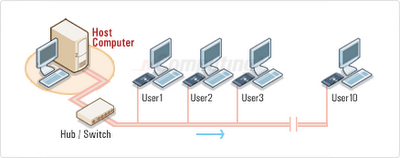
In the nComputing model, a monitor, keyboard, and mouse are hooked up to a small box that is cable-connected to a central computer. The "client" actually has no processor, RAM, or overhead of its' own. According to nComputing, costs for the boxes and software can be as low as $70 per seat, though it's likely that keyboards, monitors, and mice would not be included in that figure.
There was a demonstration of a thin-client setup at NECC; it might even have been nComputing. KSC/LSC actually played with the technology, putting it through some basic paces that might happen in a regular school setting. We surfed a little, ran a few web-based apps like Writely and Google Spreadsheets, picked up e-mail through gmail and Yahoo, and even watched a YouTube video. The video took a few minutes to load, but then played nearly flawlessly (*IF* you can call a YouTube video "flawless"). The concept, and at least the practical demo, seem to make a lot of sense.
nComputing says that most computers and their human users barely scratch the surface of chip/system capability for the most common tasks we use. Their theory is that several users can share those computing resources simultaneously and not take a significant performance hit. The clients don't even have software installed; it's all centralized on the single server or computer that's being shared. This makes for easy maintenance and updates, with lower costs to upgrade when the time comes, according to the company.
Whether or not distributed computing is "the next big thing," it's certainly an option to consider for institutional use, given the growing demand for 1:1 computing capability. Schools in Colorado and Idaho have already adopted nComputing solutions, and the company is counting on word of mouth to spread their success story around the nation and the world. But with the growing availability of web-based applications and productivity tools, it's a safe bet that distributed computing will at least get a second look from schools and organizations with high seat-count demands for low-overhead computing.
Cool, huh? Read the full post here ...
nComputing, a Korean company with operations around the world, has developed a hybrid hardware/software offering that allows the creation of up to 30 "thin client" terminals running from one server or computer. Delivering everything from data to power over cabled connections, the technology allows users to share centralized processing power and RAM, a solution that may take a performance hit on high-overhead applications like gaming, but according to the company, not on more routine school tasks like surfing the interwebs, word processing, e-mail, and basic productivity applications.

In the nComputing model, a monitor, keyboard, and mouse are hooked up to a small box that is cable-connected to a central computer. The "client" actually has no processor, RAM, or overhead of its' own. According to nComputing, costs for the boxes and software can be as low as $70 per seat, though it's likely that keyboards, monitors, and mice would not be included in that figure.
There was a demonstration of a thin-client setup at NECC; it might even have been nComputing. KSC/LSC actually played with the technology, putting it through some basic paces that might happen in a regular school setting. We surfed a little, ran a few web-based apps like Writely and Google Spreadsheets, picked up e-mail through gmail and Yahoo, and even watched a YouTube video. The video took a few minutes to load, but then played nearly flawlessly (*IF* you can call a YouTube video "flawless"). The concept, and at least the practical demo, seem to make a lot of sense.
nComputing says that most computers and their human users barely scratch the surface of chip/system capability for the most common tasks we use. Their theory is that several users can share those computing resources simultaneously and not take a significant performance hit. The clients don't even have software installed; it's all centralized on the single server or computer that's being shared. This makes for easy maintenance and updates, with lower costs to upgrade when the time comes, according to the company.
Whether or not distributed computing is "the next big thing," it's certainly an option to consider for institutional use, given the growing demand for 1:1 computing capability. Schools in Colorado and Idaho have already adopted nComputing solutions, and the company is counting on word of mouth to spread their success story around the nation and the world. But with the growing availability of web-based applications and productivity tools, it's a safe bet that distributed computing will at least get a second look from schools and organizations with high seat-count demands for low-overhead computing.
Cool, huh? Read the full post here ...
Friday, September 08, 2006
Philadelphia Opens "School of the Future"
Built for $63 million, Philadelphia's new "School of the Future" is open for business. Developed in partnership between Philly and Micro$oft, the school is physically, pedagogically, and strategically innovative. The building is constructed to be "green," the homework and assessments are online, and the school's robust intranet will serve as a platform for student collaboration, teacher-parent communication, content delivery, and workspace.

Located in West Philadelphia, the school opened to 170 ninth-graders (95% of whom are black, 85% of whom come from low-income families) chosen by lottery from a field of 1500 applicants. There are/were no entrance exams, and the school is tuition-free. The lottery system, according to Philadelphia School District CEO Paul Vallas, means that the "experiment" inherent in cutting-edge education isn't "rigged" by selecting only "the best and the brightest."
Microsoft collaborated heavily with the Philadelphia board of education and school administrators, to develop a robust infrastructure that is designed to minimize paper and to maximize collaboration and information flow. Textbooks are eschewed in favor of interactive content, software, and multimedia assets. (You may recall Microsoft's failed foray into the education space with Microsoft Class Server, a "curriculum manager" that was built as a virtual learning management system.)
Microsoft has gone further with the School of the Future, envisioning a school without walls or limits, where research on the internets is par for the course, and where institutional partners such as the Philadelphia Zoo and the Museum of Art are as integrated with the school as the "food court" that replaces the traditional cafeteria.
Time will tell how well the School of the Future serves today's students, but it's a grand vision and a bold step. Whether it can shed some of the burdens on more traditional schools remains to be seen.
Cool, huh? Read the full post here ...

Located in West Philadelphia, the school opened to 170 ninth-graders (95% of whom are black, 85% of whom come from low-income families) chosen by lottery from a field of 1500 applicants. There are/were no entrance exams, and the school is tuition-free. The lottery system, according to Philadelphia School District CEO Paul Vallas, means that the "experiment" inherent in cutting-edge education isn't "rigged" by selecting only "the best and the brightest."
Microsoft collaborated heavily with the Philadelphia board of education and school administrators, to develop a robust infrastructure that is designed to minimize paper and to maximize collaboration and information flow. Textbooks are eschewed in favor of interactive content, software, and multimedia assets. (You may recall Microsoft's failed foray into the education space with Microsoft Class Server, a "curriculum manager" that was built as a virtual learning management system.)
Microsoft has gone further with the School of the Future, envisioning a school without walls or limits, where research on the internets is par for the course, and where institutional partners such as the Philadelphia Zoo and the Museum of Art are as integrated with the school as the "food court" that replaces the traditional cafeteria.
Time will tell how well the School of the Future serves today's students, but it's a grand vision and a bold step. Whether it can shed some of the burdens on more traditional schools remains to be seen.
Cool, huh? Read the full post here ...
Thursday, August 31, 2006
Cellies Get Their Campus Phreak On
The campus grapevine is going high-tech. Move over, word-of-mouth virality, and make room for Rave Wireless, a service being launched on fifteen college campuses this year, and shooting for a hundred schools in 2007.
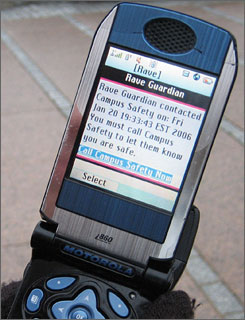
Rave Wireless is a MVNO (Mobile Voice Network Operator), essentially leasing time from the big-infrastructure wireless companies and then launching their own suite of services, handsets, and plans. (Other examples of MVNOs include ESPN, Disney, and Helio, each with their own "hook.")
Rave is designed specifically for an on-campus college student. The service/handset combination includes several student-friendly features, including the ability to pick up and track classwork assignments from a Learning Management System (LMS), instructor-generated push messaging, and handset access to an online gradebook to check out your GPA, with future plans to allow blogging, social networking, and other savory 3G/Web 2.0 snacks. In addition, the handset includes a GPS (Global Positioning System) chip, and a unique capability that is designed to increase campus safety: a student traveling from point A to point B on campus can set a timer for the duration of their trip. Then, if they don't deactivate the timer or make a call, the GPS unit transmits a "distress" call to campus security, and alerts local authorities that there may be a problem. The campus cops can call the cellie, and if they don't get an answer, can scramble fighter planes or whatever to respond to the phone's location.
There are other campus cell services out there, doing everything from notifying students of their grades to notifying them when a dryer is free in the laundry room. But Rave Wireless seems to have the richest set of offerings to date. Sheesh-- add music downloads to the handset on some kind of subscription service like Yahoo or Napster and this thing would probably be close to perfect.
The article, here, on USA Today doesn't mention monthly service fees, but one can imagine that these services carry some kind of premium. But if Mumsy and Daddums are footing the bill anyway ... . Of course, most student phones are adjuncts to some kind of family plan, so Rave, for the moment, probably means students would have to carry two handsets-- one for talking and texting, and another for all the other 3G goodness. But it's not hard to imagine services like these finding their way to the major carriers in the not-too-distant future. Converged data and communication, after all, is the name of the game. And as mentioned above, if a clever carrier adds content, the "Three Cs" will be covered and enrollment would seem to be a slam-dunk.
Cool, huh? Read the full post here ...

Rave Wireless is a MVNO (Mobile Voice Network Operator), essentially leasing time from the big-infrastructure wireless companies and then launching their own suite of services, handsets, and plans. (Other examples of MVNOs include ESPN, Disney, and Helio, each with their own "hook.")
Rave is designed specifically for an on-campus college student. The service/handset combination includes several student-friendly features, including the ability to pick up and track classwork assignments from a Learning Management System (LMS), instructor-generated push messaging, and handset access to an online gradebook to check out your GPA, with future plans to allow blogging, social networking, and other savory 3G/Web 2.0 snacks. In addition, the handset includes a GPS (Global Positioning System) chip, and a unique capability that is designed to increase campus safety: a student traveling from point A to point B on campus can set a timer for the duration of their trip. Then, if they don't deactivate the timer or make a call, the GPS unit transmits a "distress" call to campus security, and alerts local authorities that there may be a problem. The campus cops can call the cellie, and if they don't get an answer, can scramble fighter planes or whatever to respond to the phone's location.
There are other campus cell services out there, doing everything from notifying students of their grades to notifying them when a dryer is free in the laundry room. But Rave Wireless seems to have the richest set of offerings to date. Sheesh-- add music downloads to the handset on some kind of subscription service like Yahoo or Napster and this thing would probably be close to perfect.
The article, here, on USA Today doesn't mention monthly service fees, but one can imagine that these services carry some kind of premium. But if Mumsy and Daddums are footing the bill anyway ... . Of course, most student phones are adjuncts to some kind of family plan, so Rave, for the moment, probably means students would have to carry two handsets-- one for talking and texting, and another for all the other 3G goodness. But it's not hard to imagine services like these finding their way to the major carriers in the not-too-distant future. Converged data and communication, after all, is the name of the game. And as mentioned above, if a clever carrier adds content, the "Three Cs" will be covered and enrollment would seem to be a slam-dunk.
Cool, huh? Read the full post here ...
Monday, August 28, 2006
Dramatic MySpace Vulnerability Exposed, Closed
Members or readers of social network site digg.com are today engaging in some self-congratulation. Seems the "digg effect" was in play Sunday, whereby a digg user posted a blog post about a major security hole in MySpace. Turns out, all you had to do was append a few letters to the end of a "private" MySpace url and you could see everything that was intended to be password-protected. In other words, "private" was really public, with the simplest of hacks. Literally all you had to do was enter a few characters at the end of the url in your browser; this is something anyone could have done, and probably "anyone" was doing it.

Apparently the vulnerability was originally discovered in April of 2006, and was-- allegedly-- brought to the attention of MySpace administrators. But it took something of a wake-up call to get the MySpace techies mobilized, it seems. After months of inaction, someone posted the details of the vulnerability on digg, where the story received thousands of diggs (votes) and which doubtless generated hundreds of hits to MySpace to try the hack. The story appeared on digg on August 27.
By the following day, the vulnerability had been plugged, at least temporarily, by an abashed MySpace. Digg users, naturally, claim credit for bringing focus to the issue and forcing MySpace to do something about it. There isn't an obvious mention of the issue on the front pages of myspace; it's unclear whether there's any way to tell if a user's "private" content was viewed by someone using the exploit.
This is yet another example of the potential "dangers" of online social networks, but it's also a great example of how another social network (digg) was able to rally their user base and create a positive outcome. While it's scary that lots of private data may have been compromised, it's also good to know that there are enough "good guys" out there to rally around an issue that needs attention, and bring about a resolution (however belated). Let's hope the diggers and other networks like them keep a weather eye open for John Q Public. And for heaven's sake, PLEASE be smart about what you post to your online presence-- even private stuff is likely to be viewed by people you don't know. Be smart, and don't post anything online that you wouldn't put on a billboard along a major highway. Read the full post here ...

Apparently the vulnerability was originally discovered in April of 2006, and was-- allegedly-- brought to the attention of MySpace administrators. But it took something of a wake-up call to get the MySpace techies mobilized, it seems. After months of inaction, someone posted the details of the vulnerability on digg, where the story received thousands of diggs (votes) and which doubtless generated hundreds of hits to MySpace to try the hack. The story appeared on digg on August 27.
By the following day, the vulnerability had been plugged, at least temporarily, by an abashed MySpace. Digg users, naturally, claim credit for bringing focus to the issue and forcing MySpace to do something about it. There isn't an obvious mention of the issue on the front pages of myspace; it's unclear whether there's any way to tell if a user's "private" content was viewed by someone using the exploit.
This is yet another example of the potential "dangers" of online social networks, but it's also a great example of how another social network (digg) was able to rally their user base and create a positive outcome. While it's scary that lots of private data may have been compromised, it's also good to know that there are enough "good guys" out there to rally around an issue that needs attention, and bring about a resolution (however belated). Let's hope the diggers and other networks like them keep a weather eye open for John Q Public. And for heaven's sake, PLEASE be smart about what you post to your online presence-- even private stuff is likely to be viewed by people you don't know. Be smart, and don't post anything online that you wouldn't put on a billboard along a major highway. Read the full post here ...
Friday, August 25, 2006
OLPC Launches CM1, First Production Model
Finally, finally, we can stop calling the machine being developed by the OLPC project "the OLPC," which really didn't make much sense practically or grammatically. The do-dad has at last been christened with the catchy moniker "CM1," or, "Children's Machine 1."

Not only have they launched an actual product with a name and everything, they've actually upped the ante hardware-wise and are throwing in some unexpected gadget love on the $140 lapsters.

Derided by critics as being "too small," the 8" display on CM1 will actually carry a higher resolution than most full-sized lappies: a whopping 1200x900 resolution! In addition, the CM1 will launch with speaker and microphone jacks, which is fueling speculation about VoIP capabilities when the production models roll in 2007. The mesh-networkable CM1 will still only carry 128MB of DRAM and 512MB of flash-based storage, but work is underway to upgrade the processor to a speedier 400MHz and there will be a built-in still/video camera. Skype video calls, anyone? "Hello, future? It's Thailand calling ... ." (Of course, now you can be solicited more personally by the displaced Nigerian royalty as they earnestly offer to share their wealth with you, for just allowing them to deposit to your bank account ... .) Read the full post here ...

Not only have they launched an actual product with a name and everything, they've actually upped the ante hardware-wise and are throwing in some unexpected gadget love on the $140 lapsters.

Derided by critics as being "too small," the 8" display on CM1 will actually carry a higher resolution than most full-sized lappies: a whopping 1200x900 resolution! In addition, the CM1 will launch with speaker and microphone jacks, which is fueling speculation about VoIP capabilities when the production models roll in 2007. The mesh-networkable CM1 will still only carry 128MB of DRAM and 512MB of flash-based storage, but work is underway to upgrade the processor to a speedier 400MHz and there will be a built-in still/video camera. Skype video calls, anyone? "Hello, future? It's Thailand calling ... ." (Of course, now you can be solicited more personally by the displaced Nigerian royalty as they earnestly offer to share their wealth with you, for just allowing them to deposit to your bank account ... .) Read the full post here ...
Monday, August 21, 2006
$80M in Tech Funding to Florida's Poorest Districts
The latest in a series of lawsuit settlements has impoverished school districts in Florida slated to receive $80M from Micro$oft. Following on the heels of a similar payout in California (to the tune of about $500M), the Florida deal sends much-needed tech funding to districts with 50% or more of their enrolled students receiving reduced-cost or no-cost lunch. This according to an article from the wire services and eSchool News (here).
The Florida payout actually saves Micro$oft tens of millions of dollars. The original antitrust lawsuit was brought against the company by the Attorneys General of several states (including Minnesota, Montana, Vermont, California, and Florida). As part of the terms of the settlement, consumers who were unfairly "forced" into using MicroSoft products were able to receive vouchers for between $5 and $12 for computer software or hardware from any company. The money going to the schools in Florida represents 50% of the funds unclaimed by consumers. MicroSoft is able to recoup some of the unclaimed funds as well. Florida's total payout was not to exceed $202,000,000. Read the full post here ...
The Florida payout actually saves Micro$oft tens of millions of dollars. The original antitrust lawsuit was brought against the company by the Attorneys General of several states (including Minnesota, Montana, Vermont, California, and Florida). As part of the terms of the settlement, consumers who were unfairly "forced" into using MicroSoft products were able to receive vouchers for between $5 and $12 for computer software or hardware from any company. The money going to the schools in Florida represents 50% of the funds unclaimed by consumers. MicroSoft is able to recoup some of the unclaimed funds as well. Florida's total payout was not to exceed $202,000,000. Read the full post here ...
Friday, August 18, 2006
User Interface of the Future
This is absolutely amazing. Jeff Han, from New York University, gives a demo of a multi-touch-sensitive screen interface that can literally and dramatically change the interface between humans and machines.
The software he demonstrates in the video clip are cool in a gee-whiz kind of way, but more importantly they offer a glimpse into how software can interpret sensory input, or maybe it's more accurate to say "sensory output," a tactile and intuitive means of adjusting everything from scale to axis to 3-D mesh objects.
The video was posted on the Wired Campus blog from the Chronicle of Higher Education. No subscription is required (click the Source link below to see that post). The demo is very impressive, but more dramatic are the things that can be envisioned and now enacted by people to completely reshape the way we interact with data, images, and machines. You seriously need to check out the manipulative capabilities of this input device.
Read the full post here ...
The software he demonstrates in the video clip are cool in a gee-whiz kind of way, but more importantly they offer a glimpse into how software can interpret sensory input, or maybe it's more accurate to say "sensory output," a tactile and intuitive means of adjusting everything from scale to axis to 3-D mesh objects.
The video was posted on the Wired Campus blog from the Chronicle of Higher Education. No subscription is required (click the Source link below to see that post). The demo is very impressive, but more dramatic are the things that can be envisioned and now enacted by people to completely reshape the way we interact with data, images, and machines. You seriously need to check out the manipulative capabilities of this input device.
Read the full post here ...
One Dude Talks Smack on OLPC
OK, we get it: not everbody is a fan of the OLPC program-- peer-to-peer mesh networks of no-storage hand-cranked (or pull-stringed) minicomputers. According to Christopher Dawson, in his blog post (here) on ZDNet's education page, "AMD Gets It." "It" being shared, fully-functional, hyper-utilized community resources with a more robust infrastructure.
While nobody debates the lilliputian computing capacity of the OLPC lappies, it's interesting to note how the debate over developing-world technology draws itself into a tri-polar battlefield. There are the OLPC believers, who think that unleashing a personal device with the ability to connect to its' peers with minimal infrastructure means a more "democratic" platform of distributed computing. Then there are the non-computing campers, such as Micro$oft's Billy Gates, who claim that converged devices like a phone/pda/pim are the way to go. Then there's Dawson's platform: spend the money building out infrastructure and put in communal, fully-functional machines (refurbished discards are often touted) that will unleash the full computing power of the industrialized world upon the 'poor, huddled masses yearning to key free.'
Thailand will pilot 500 OLPCs for an eventual rollout of 1 million units in 2007. Brazil, meanwhile, is on the fence, courting proposals from Negroponte and also AMD. Then there's India, who have soundly rejected OLPC but haven't announced what they'll do instead. Sadly, while the debate is so polarizing, some governments-- Nigeria, for example-- may choose to sit out the mating dances and wait for some models to emerge. On the one hand, that's probably good, because no one solution is necessarily "right" for every nation. But on the other hand, the clock is ticking, and every day that goes by is another 419 scam opportunity wasted.
Where do you stand on computing and technology in the emerging world? Comment this post and let's start the debate afresh in these very pages. Read the full post here ...
While nobody debates the lilliputian computing capacity of the OLPC lappies, it's interesting to note how the debate over developing-world technology draws itself into a tri-polar battlefield. There are the OLPC believers, who think that unleashing a personal device with the ability to connect to its' peers with minimal infrastructure means a more "democratic" platform of distributed computing. Then there are the non-computing campers, such as Micro$oft's Billy Gates, who claim that converged devices like a phone/pda/pim are the way to go. Then there's Dawson's platform: spend the money building out infrastructure and put in communal, fully-functional machines (refurbished discards are often touted) that will unleash the full computing power of the industrialized world upon the 'poor, huddled masses yearning to key free.'
Thailand will pilot 500 OLPCs for an eventual rollout of 1 million units in 2007. Brazil, meanwhile, is on the fence, courting proposals from Negroponte and also AMD. Then there's India, who have soundly rejected OLPC but haven't announced what they'll do instead. Sadly, while the debate is so polarizing, some governments-- Nigeria, for example-- may choose to sit out the mating dances and wait for some models to emerge. On the one hand, that's probably good, because no one solution is necessarily "right" for every nation. But on the other hand, the clock is ticking, and every day that goes by is another 419 scam opportunity wasted.
Where do you stand on computing and technology in the emerging world? Comment this post and let's start the debate afresh in these very pages. Read the full post here ...
Friday, July 28, 2006
Dopey DOPA Language Passes House

By a really big margin (something like 400 to 15!), the US House of Representatives passed the Delete Online Predators Act today (DOPA), which has basically just deleted Web 2.0 from every school and library in America.
The act, not content with going after online predators, instead bans access to ANY community site, collaborative space, or peer-mediated/edited/commented site on the internets. Wikipedia? Gone (OK, some may cheer about that one). Digg? Gone. Naturally the MySpace and Friendster and Facebook and Xanga sites are going down. But so too are del.ici.ous, Flickr, Picasa, Yahoo!, MSN, and any other site that actually accepts incoming traffic. Blogger, Blogspot, and the others? History. Your class blog, where you post your podcasts or whatever? Unless it's on a school server behind your firewall, it's gone. Basically, if a user can put up content, the site is off limits.
This is a blatant example of over-reaction and hyperbolic hysteria. Now, rather than being able to teach our kids how to be safe on the internets, how to contribute, how to collaborate; we can't show them examples (good nor bad) of the power of interconnectivity. It's like closing down all roads and highways that aren't dead ends. To be crass, but 100% to-the-point: WTF?
If you're an activist of any kind; if you've EVER written to your representatives in government about anything, this would be a good time to do so again. Click the link, use the little drop-down menu in the top right, get to your Senator's page, and send an e-mail. The bill still has to pass the Senate, so there's a chance-- a slim, snowball's chance-- that the language can be fixed. Naturally no politician wants to look like he's soft on pedophilia in an election year, so odds are that nobody will do anything to stop this travesty. But maybe, just maybe, if we all get up our nerve and let them know, maybe they'll realize they've thrown the baby out with the bathwater on this one. Read the full post here ...
Gates Unveils "FonePlus," the NextThing with TwoCaps and NoSpace
With their own horse now in the race, Microsoft has joined the illustrious ranks of players in the game of computing for the "poor, huddled masses, yearning to browse." Or, more accurately, "Many people, including us, have been looking at different ways to lower the cost" of computing, according to Craig Mundie, the Chief Research and Strategy Officer (CRASO?) at Microsoft. "Clearly one of the things that is just booming globally is the use of the cell phone." This according to CNet News (article here).
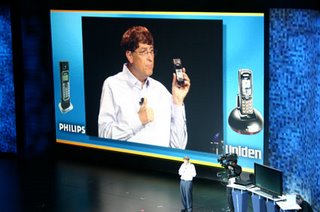
Chairman Gates (the reknowned champion for consumer-friendly businesses!) has said, here in this very blog (OK, he was quoted here, he didn't actually sit for an interview), that he believes that smartphones are the way to bring computing and connectivity to the masses. Now he's unveiled FonePlus, which apparently will do just that (but obviously not help with spelling skillz).
Specs are short for now, but the gist is that Microsoft is backing a play to put Windows CE into the hands of the developing world. Ostensibly a challenge to the OLPC and/or Intel's EduWise (another SuperSpeller!), the FonePlus will deliver reliable (Windows CE?!), affordable (no price announced), portable (how good is the battery?) technology to the burgeoning mobile phone community. Gates seems to feel that cellular waves are more ubiquitous than WiFi, thus making the FonePlus more apt to bring users online (are there really 3G networks outside of Bangalore?).
Time will tell whether this concept-- or any of these concepts-- will truly unleash the developing world onto the internets, but a variety of approaches is more likely to have "the" right answer, n'est-ce pas? Read the full post here ...

Chairman Gates (the reknowned champion for consumer-friendly businesses!) has said, here in this very blog (OK, he was quoted here, he didn't actually sit for an interview), that he believes that smartphones are the way to bring computing and connectivity to the masses. Now he's unveiled FonePlus, which apparently will do just that (but obviously not help with spelling skillz).
Specs are short for now, but the gist is that Microsoft is backing a play to put Windows CE into the hands of the developing world. Ostensibly a challenge to the OLPC and/or Intel's EduWise (another SuperSpeller!), the FonePlus will deliver reliable (Windows CE?!), affordable (no price announced), portable (how good is the battery?) technology to the burgeoning mobile phone community. Gates seems to feel that cellular waves are more ubiquitous than WiFi, thus making the FonePlus more apt to bring users online (are there really 3G networks outside of Bangalore?).
Time will tell whether this concept-- or any of these concepts-- will truly unleash the developing world onto the internets, but a variety of approaches is more likely to have "the" right answer, n'est-ce pas? Read the full post here ...
Oh, SNAP! OLPC Gets Chilly Reception in India
Seems the HRD Ministry of India (Human Relations and Development, I think) doesn't like to be told how to spend their money. At least, reading between the lines of the article in the Times of India, that was the apparent message.
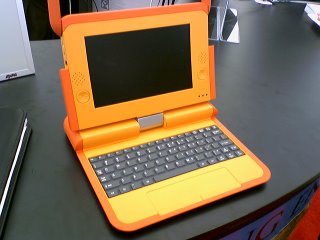
Apparently, the presentation in April by Nicholas Negroponte of the OLPC project failed to win him friends or influence people. In fact, the Ministry went as far as to claim that implementing computers for the subcontinent's students was little more than junk science. " It would be impossible to justify an expenditure of this scale on a debatable scheme when public funds continue to be in inadequate supply for well-established needs listed in different policy documents," the ministry said.
"Debatable scheme" though it may be, the OLPC project has garnered worldwide attention in recent months as prototype models have been unveiled. Negroponte will be returning to India for another presentation in August, for what may be a bit of windmill-tilting. This while the program is assailed by competitors, no less.
While pragmatic debate about resource allocation may doom the project in India, other countries including Nigeria* and China appear to be more open to providing a lappie to every lamb in the flock. That the OLPC program has failed to gain financial commitments in the Western world, however, seems a harbinger for India's HRD Ministry. Time will tell whether empowerment through democratization of technology is a better salve to developing nations' challenges. Mayhap some industrialized nation needs to step up to the plate and lend some cred to the diminutive device?
*POSTSCRIPT: Do 100,000 laptops in Nigeria mean more princes who need our help to rescue the millions in private family riches, if we'll only send our bank account information?? Read the full post here ...

Apparently, the presentation in April by Nicholas Negroponte of the OLPC project failed to win him friends or influence people. In fact, the Ministry went as far as to claim that implementing computers for the subcontinent's students was little more than junk science. " It would be impossible to justify an expenditure of this scale on a debatable scheme when public funds continue to be in inadequate supply for well-established needs listed in different policy documents," the ministry said.
"Debatable scheme" though it may be, the OLPC project has garnered worldwide attention in recent months as prototype models have been unveiled. Negroponte will be returning to India for another presentation in August, for what may be a bit of windmill-tilting. This while the program is assailed by competitors, no less.
While pragmatic debate about resource allocation may doom the project in India, other countries including Nigeria* and China appear to be more open to providing a lappie to every lamb in the flock. That the OLPC program has failed to gain financial commitments in the Western world, however, seems a harbinger for India's HRD Ministry. Time will tell whether empowerment through democratization of technology is a better salve to developing nations' challenges. Mayhap some industrialized nation needs to step up to the plate and lend some cred to the diminutive device?
*POSTSCRIPT: Do 100,000 laptops in Nigeria mean more princes who need our help to rescue the millions in private family riches, if we'll only send our bank account information?? Read the full post here ...
Friday, June 23, 2006
Texas Gears Up for Online Testing
They won't be first, but they could be the biggest, depending on how many district superintendents, or in some cases building principals, decide to take advantage of new policy in Texas. Beginning in the 2006-07 school year, statewide assessments (TAKS, for Texas Assessment of Knowledge and Skills) for grades 7 and up will have the option of online delivery. See the story here on the Dallas Morning News site.

While it's new ground broken for Texas, there are several other states for whom online testing has become the norm. Virginia, for example, gives 90% of their statewide assessments online.
Advantages and potential risks are being debated in the Lone Star State, but most of the minefield for online testing has been mapped already. Assuming the Texans can learn from their early-adopter neighbors, the move could lead to an eventual policy of mandated online testing. At the very least, the online option gives schools or districts (depending on who makes the call) the chance at a level playing field and reap the benefits, including near-real-time results. Proponents praise paperless testing as the eventuality for which it is time. State administrators feel that their servers have the bandwidth, or could obtain it, to serve hundreds of thousands of test-takers in 2007.
Cool, huh? Read the full post here ...

While it's new ground broken for Texas, there are several other states for whom online testing has become the norm. Virginia, for example, gives 90% of their statewide assessments online.
Advantages and potential risks are being debated in the Lone Star State, but most of the minefield for online testing has been mapped already. Assuming the Texans can learn from their early-adopter neighbors, the move could lead to an eventual policy of mandated online testing. At the very least, the online option gives schools or districts (depending on who makes the call) the chance at a level playing field and reap the benefits, including near-real-time results. Proponents praise paperless testing as the eventuality for which it is time. State administrators feel that their servers have the bandwidth, or could obtain it, to serve hundreds of thousands of test-takers in 2007.
Cool, huh? Read the full post here ...
Thursday, June 15, 2006
High-Pitched Battle for Cell Phone Use in School
From about 4700 different sites, including but not limited to a story on e-School News, comes word of a new ringtone for cellies. Turns out most adults CAN'T HEAR IT, making it a preferred choice for students in schools where phone use is "banned" (read: driven underground).

Seems most adults lose the ability to hear very high-pitched noises as we age, but the little lambs with their relatively unscathed eardrums can make out this noise just fine. This makes "pinging" their friends in school easy and stealthy. Mrs. Smith and Mr. Jones can't hear the tone, but Johnny and Soshanna can, so they're able to text, IM, or what-have-you without their teachers knowing.
Of course, this doesn't preclude teachers from seeing phones in use, but if the little darlings are sufficiently surreptitous they can now get over on the old timers.
Interestingly, the idea was borne from a UK practice of blasting high-frequency sounds at shopping malls and other popular teen hangouts, making kids move on to quieter (less visible) haunts without disturbing mumsie and daddums while they perused the latest shoe sale. Now teens have turned the tables. Kudos for their ingenuity; guess schools will have to either cave on their cell bans or go with that signal-strangling copper-based paint being shopped to movie theaters. Read the full post here ...

Seems most adults lose the ability to hear very high-pitched noises as we age, but the little lambs with their relatively unscathed eardrums can make out this noise just fine. This makes "pinging" their friends in school easy and stealthy. Mrs. Smith and Mr. Jones can't hear the tone, but Johnny and Soshanna can, so they're able to text, IM, or what-have-you without their teachers knowing.
Of course, this doesn't preclude teachers from seeing phones in use, but if the little darlings are sufficiently surreptitous they can now get over on the old timers.
Interestingly, the idea was borne from a UK practice of blasting high-frequency sounds at shopping malls and other popular teen hangouts, making kids move on to quieter (less visible) haunts without disturbing mumsie and daddums while they perused the latest shoe sale. Now teens have turned the tables. Kudos for their ingenuity; guess schools will have to either cave on their cell bans or go with that signal-strangling copper-based paint being shopped to movie theaters. Read the full post here ...
More Internets From Which To Choose
NewNet. Internet2. NLR. Plus the tired old workhorse the World Wide Web. Soon, you'll be hopping from one ultra-fast network to another the way you currently jump from website to website.
Internet2, a consortium of primarily academically-rooted interests, has announced that they're dumping plans to build a next-gen interweb with Qwest in favor of a new fiber-optic information highway to be built by Level3 Communications. Current plans call for a launch of some kind in 2008. NewNet will also facilitate the construction of ad-hoc subnetworks leveraging not just fat pipes but also better data protocols that will enable true and virtual networking of a speed and facility not yet seen.
This, of course, is a different bunch of players with a different interweb, and should not be confused with National LambdaRail, which is being built by a consortium of primarily research-driven interests. Talks between the two consortia to explore their collaborative development of one meganet fell apart last Spring. So they're taking their toys and each will build their own. Desolee, dudes. So sorry.
Ah, the halcyon days of the old ARPANET. Remember when "surfing" meant creative use of the asterisk key in a futile attempt to avoid the wrath of the *P Police? We've come a long way, baby! (Soon we'll be able to get the "BEST DEALS ON V1agr4 and 4mb13n" in nanoseconds. Compared to the milliseconds it takes now.)
Cool, huh? Read the full post here ...
Internet2, a consortium of primarily academically-rooted interests, has announced that they're dumping plans to build a next-gen interweb with Qwest in favor of a new fiber-optic information highway to be built by Level3 Communications. Current plans call for a launch of some kind in 2008. NewNet will also facilitate the construction of ad-hoc subnetworks leveraging not just fat pipes but also better data protocols that will enable true and virtual networking of a speed and facility not yet seen.
This, of course, is a different bunch of players with a different interweb, and should not be confused with National LambdaRail, which is being built by a consortium of primarily research-driven interests. Talks between the two consortia to explore their collaborative development of one meganet fell apart last Spring. So they're taking their toys and each will build their own. Desolee, dudes. So sorry.
Ah, the halcyon days of the old ARPANET. Remember when "surfing" meant creative use of the asterisk key in a futile attempt to avoid the wrath of the *P Police? We've come a long way, baby! (Soon we'll be able to get the "BEST DEALS ON V1agr4 and 4mb13n" in nanoseconds. Compared to the milliseconds it takes now.)
Cool, huh? Read the full post here ...
OLPC Gets Real
The now-infamous OLPC project unvelied a pair of working prototypes this month, demonstrating the operating system and networking capabilities of the machine. Later, OLPC program chief Nicholas Negroponte announced that the project has revised the target price of the meshalicious lappie from the original $100 per unit to as much as $140, though their goal of delivering units in late 2007 seems to be on track.

No word on whether the new price has affected pre-order status in the various target markets, though it's a safe bet that countries will likely stick to their spending target and simply order fewer units. What that means in terms of one-to-one computing remains to be seen.
Pricing issues aside, the working prototypes prove that the concept has legs and the units will actually be capable of basic networking and productivity work. Cool, huh? Read the full post here ...

No word on whether the new price has affected pre-order status in the various target markets, though it's a safe bet that countries will likely stick to their spending target and simply order fewer units. What that means in terms of one-to-one computing remains to be seen.
Pricing issues aside, the working prototypes prove that the concept has legs and the units will actually be capable of basic networking and productivity work. Cool, huh? Read the full post here ...
Mississippi Super Wants Self-Paced Alternative
According to a story in e-School News, the Mississippi Superintendent of Education has proposed a $20,000,000 program that would target at-risk and traditional non-finishers and offer a self-paced, workplace-oriented graduation alternative. Students would be able to enroll in the program as an alternative to regular classes, and work at their own speed through a curriculum focused on preparing to enter the working world.
Designed to combat drop-out rates and to engage nontraditional learners or those not planning on a collegiate career, the program would offer online classes statewide (noticing a trend here?) through which students would work at their own pace, taking as many concurrent classes as they see fit. While this could result in an elongated matriculation, it could, conceivably, also result in accelerated study.
According to Hank Bound, the state Superintendent, the plan would combat the high dropout rate-- more than 35% of high school students don't graduate-- and would offer participants the chance to enter the workforce as a more effective worker.
Cool, huh? Read the full post here ...
Designed to combat drop-out rates and to engage nontraditional learners or those not planning on a collegiate career, the program would offer online classes statewide (noticing a trend here?) through which students would work at their own pace, taking as many concurrent classes as they see fit. While this could result in an elongated matriculation, it could, conceivably, also result in accelerated study.
According to Hank Bound, the state Superintendent, the plan would combat the high dropout rate-- more than 35% of high school students don't graduate-- and would offer participants the chance to enter the workforce as a more effective worker.
Cool, huh? Read the full post here ...
Missouri Close to Statewide Virtual School
The Missouri Legislature approved a bill that will allow a new statewide virtual public school, and sent the bill to Governor Matt Blunt for his sign-off.
According to USA Today, "The 'virtual school' would begin offering courses during the 2007-2008 school year under legislation given final approval by a 136-20 House vote. The Senate passed the bill 31-0 last month, meaning it now goes to Gov. Matt Blunt."
Statewide distance learning programs are gaining popularity, or at least garnering support, as departments of education hither and yon realize that online classes can be, and perhaps should be, "centralized" in that they're offered to students across an entire state. Cool, huh?
What might be cooler is taking the next logical step, which is to troll the brick-and-mortar institutions looking for the best and brightest courses to be offered this way. In other words, don't create new online courses, but find the best traditional courses offered in the state and bring them online. The best current events teacher, the best computer science course ... of course, the catch there is deciding who gets to determine what's best and how "best" is even defined. But still, there are tons of great teachers offering great courses. Adapting those great classes to be webcast would take some tweaking, but that's probably easier and will garner better results than starting from scratch.
Cool, huh? Read the full post here ...
According to USA Today, "The 'virtual school' would begin offering courses during the 2007-2008 school year under legislation given final approval by a 136-20 House vote. The Senate passed the bill 31-0 last month, meaning it now goes to Gov. Matt Blunt."
Statewide distance learning programs are gaining popularity, or at least garnering support, as departments of education hither and yon realize that online classes can be, and perhaps should be, "centralized" in that they're offered to students across an entire state. Cool, huh?
What might be cooler is taking the next logical step, which is to troll the brick-and-mortar institutions looking for the best and brightest courses to be offered this way. In other words, don't create new online courses, but find the best traditional courses offered in the state and bring them online. The best current events teacher, the best computer science course ... of course, the catch there is deciding who gets to determine what's best and how "best" is even defined. But still, there are tons of great teachers offering great courses. Adapting those great classes to be webcast would take some tweaking, but that's probably easier and will garner better results than starting from scratch.
Cool, huh? Read the full post here ...
Yes, Mother, I'm Doing My Homework
OK, ok, we know it's been, like, almost a month since our last post. Our relentless pursuit of the American Dream, and the associated tedium of Corporateville, have hogged our time.
That said, things look like they're settling down to the point of allowing a bit more blogging these days, so we'll try to catch up. Some of the posts may refer to news items that are a week or three old, but we've been Google Notebooking lots of interesting things, we just haven't posted on them yet. Thanks for hanging in there and checking back; site stats show that traffic to the blog has been steady and even spiked a little in spite of our silent spell.
Enough mea culpae, time to brang da funk. Read the full post here ...
That said, things look like they're settling down to the point of allowing a bit more blogging these days, so we'll try to catch up. Some of the posts may refer to news items that are a week or three old, but we've been Google Notebooking lots of interesting things, we just haven't posted on them yet. Thanks for hanging in there and checking back; site stats show that traffic to the blog has been steady and even spiked a little in spite of our silent spell.
Enough mea culpae, time to brang da funk. Read the full post here ...
Thursday, May 04, 2006
Intel's Eduwise Unveiled
At the World Congress on Information Technology in Austin, Intel's Paul Otellini rolled out more details about Intel's plans for worldwide education and showed a prototype of the new, low-cost, Eduwise computer.
Speaking at the event, Otellini cited Intel founders gordon Moore and Andy Grove, explaining that Moore's law (doubling computing power every 18 months) and Grove's vision of a billion interconnected PCs worldwide are coming to fruition.

“Moore’s Law and volume economics made PC technology broadly accessible, and Andy understood the tremendous additive force of the Internet. But this power is still out of reach for most of the world’s people. The World Ahead Program, which integrates Intel’s efforts in accessibility, connectivity and education, seeks a multiplier effect to accelerate the next wave of gains.”
(Click the link to ...
Part of Intel's World Ahead program includes the Eduwise PC, which Otellini announced a month ago with a target price of $400. Today, he showed off a prototype. Specs are still sketchy, but Otellini did say that the machine will include wireless networking, collaborative tools, and will be able to run Windows or Linux operating systems.

From a press release on Intel's site:
"With students using the Eduwise notebook in class, a teacher can make presentations, control what a student has access to, and interact individually with each student in giving tests or providing feedback. The Intel-developed education application integrates with other non-computing learning tasks such as note taking and handwriting with wireless pen attachments. Because it is a fully featured PC, the Eduwise design can accommodate other standard software and tools for additional needs and uses.
Otellini also announced that Intel and the Mexican government have reached an agreement to make Intel’s new low-cost, fully featured PC available to 300,000 teachers by year’s end. The systems, unveiled last month in Mexico by Otellini as part of Intel’s Discover the PC initiative, provide an easy-to-use, fully functional PC for first-time users. Intel also plans to extend teacher training to 400,000 teachers in Mexico through the Intel Teach to the Future program by 2010."
Big plans. And while Intel's ambition is commendable, the rush to such noble goals is not without its' mercenary aspects. Intel is playing a game of catch-up, to a certain extent, with OLPC, or One Laptop Per Child, a program launched and then spun off by MIT Media Labs and headed by entrepreneur Nicholas Negroponte.
Intel's Otellini has been derisive of the OLPC concept, which aspires to $100 lower-end machines that can be powered by hand crank and which run open-source firmware and software, and operate as nodes on a mesh network platform. In his remarks today, Otellini took a thinly-veiled shot at OLPC, saying "nobody wants to cross the digital divide using yesterday's technology."
While the Intel chief's statement may be true on the surface, his rivalry with OLPC may be misplaced. In fact, the OLPC program is specifically targeting developing markets where a lack of infrastructure may prevent a higher-end machine like Intel's from crossing that digital divide. Otellini's vision depends on basic requirements such as power and established network hardware, whereas the OLPC unit assumes that infrastructure is BYON (build your own network).
Whether these rivals go mano-a-mano in developing countries, or they each find and fill their own niche in that digital divide, one thing is clear: computing for the masses is coming soon to students who are currently left out of the global information economy. That's a good thing, no matter which model(s) gain critical mass. Cool, huh?
Read the full post here ...
Speaking at the event, Otellini cited Intel founders gordon Moore and Andy Grove, explaining that Moore's law (doubling computing power every 18 months) and Grove's vision of a billion interconnected PCs worldwide are coming to fruition.

“Moore’s Law and volume economics made PC technology broadly accessible, and Andy understood the tremendous additive force of the Internet. But this power is still out of reach for most of the world’s people. The World Ahead Program, which integrates Intel’s efforts in accessibility, connectivity and education, seeks a multiplier effect to accelerate the next wave of gains.”
(Click the link to ...
Part of Intel's World Ahead program includes the Eduwise PC, which Otellini announced a month ago with a target price of $400. Today, he showed off a prototype. Specs are still sketchy, but Otellini did say that the machine will include wireless networking, collaborative tools, and will be able to run Windows or Linux operating systems.

From a press release on Intel's site:
"With students using the Eduwise notebook in class, a teacher can make presentations, control what a student has access to, and interact individually with each student in giving tests or providing feedback. The Intel-developed education application integrates with other non-computing learning tasks such as note taking and handwriting with wireless pen attachments. Because it is a fully featured PC, the Eduwise design can accommodate other standard software and tools for additional needs and uses.
Otellini also announced that Intel and the Mexican government have reached an agreement to make Intel’s new low-cost, fully featured PC available to 300,000 teachers by year’s end. The systems, unveiled last month in Mexico by Otellini as part of Intel’s Discover the PC initiative, provide an easy-to-use, fully functional PC for first-time users. Intel also plans to extend teacher training to 400,000 teachers in Mexico through the Intel Teach to the Future program by 2010."
Big plans. And while Intel's ambition is commendable, the rush to such noble goals is not without its' mercenary aspects. Intel is playing a game of catch-up, to a certain extent, with OLPC, or One Laptop Per Child, a program launched and then spun off by MIT Media Labs and headed by entrepreneur Nicholas Negroponte.
Intel's Otellini has been derisive of the OLPC concept, which aspires to $100 lower-end machines that can be powered by hand crank and which run open-source firmware and software, and operate as nodes on a mesh network platform. In his remarks today, Otellini took a thinly-veiled shot at OLPC, saying "nobody wants to cross the digital divide using yesterday's technology."
While the Intel chief's statement may be true on the surface, his rivalry with OLPC may be misplaced. In fact, the OLPC program is specifically targeting developing markets where a lack of infrastructure may prevent a higher-end machine like Intel's from crossing that digital divide. Otellini's vision depends on basic requirements such as power and established network hardware, whereas the OLPC unit assumes that infrastructure is BYON (build your own network).
Whether these rivals go mano-a-mano in developing countries, or they each find and fill their own niche in that digital divide, one thing is clear: computing for the masses is coming soon to students who are currently left out of the global information economy. That's a good thing, no matter which model(s) gain critical mass. Cool, huh?
Read the full post here ...
Tuesday, May 02, 2006
Net Neutrality and the Broadcast Flag-- Oh, NO!!
Ted Stevens, the senator from Alaska, has put forth a new bill that basically trashes the rights of the common dudes and dudettes in favor of corporate bigs.
Not normally known for its' political rantings, WTKSC is taking a moment to foray into the realm of politics to URGE you to look into this issue and ACT ON IT.

The new bill is a sweeping piece of legislation aimed at the broadcasting, communications, music, and movie industries. The bill has lost what little it originally had in it as protection for Joe Sixpack when it came to the internets. Major telecom players-- think AT&T, for example-- want the right to sell your place in the flow of traffic over the internets. In essence, they'd sell the rights to "priority" traffic, so that companies and individuals who don't pay up get their content squeezed through whatever tiny amount of pipe is left. Think of it this way: e-mail could take hours or days to arrive at its' destination. "Instant" messages? Not so much. See, companies would pay so that their sites, their traffic, their information, gets to travel in a fast lane on the information highway. The rest of us schlubs who pay monthly fees for the privilege of internet access would have our content shoved to the shoulder, plodding along like a dray in a drag race with a dodge.
Search companies would have to pay through the nose to serve you your results. Sites like this one, small, independent blogs-- gone. There's no way they could ever cough up the cash to stay competitive with "real" (read: high-budget) information sites run by giant corporations.
In essence, this is a way for companies who own the networks over which all the internets' traffic travels to charge double: They charge you for your access to the information, but they'd also charge the information providers for delivering the information to your browser. Without Net Neutrality, the big telcos and infrastructure companies can regulate whose content moves and whose doesn't. They can literally stop the flow of information for lack of toll charges. But add this to the mix: information publishers would have to pay many tolls to many companies; the traffic flow of the internets use pathways through many companies' wires. In essence, the publishers would have to pay tolls for using any and all possible pathways to their end user's browser, just to ensure that their content gets there.
Without Net Neutrality, you could find yourself in the middle of a turf war between, say, AT&T and Verizon. Let's say AT&T forms a strategic partnership with Micro$oft. And to stay competitive, Verizon inks a deal with Google. If you're an AT&T customer, you won't be able to do a Google search, you could be forced to use only MSN. "But wait," you say, "I'm a cable internet subscriber." Ah, well, you'll use the search engine that your service provider tells you to. And the news sites they allow through their network. And only the blogs they collect from. And only the shopping sites who pay up. It goes on and on.
Without Net Neutrality, internet traffic becomes subject to the mercenary whims of the network owners. Rather than being "on call" to your browser whenver you want it, site such-and-such will have to pay a fee for every hit you make to their site. And if they don't pay up, you won't be able to see that site any more. Your e-mail-- freemail accounts not through your ISP-- would be subject to delivery fees. Your monthly subscription will not cover "out of network" services. (Sound familiar? "Out of network" translates to "expensive," whether it's a dentist or a website.)
The other, more lovely little piece of dastardly darwinism gets buried deep inside the bill, and will enable content providers to tag their content with a "broadcast flag." Intended to protect the rights of the likes of the RIAA and MPAA, the broadcast flag will prevent consumers from recording content. No TiVo, no VCR, no taping FM radio to hear your favorite classic rock tunes on your own schedule. No place-shifting, no time-shifting. Nada. Zip.
You either watch CSI "live" when it's first broadcast to your TV via your ($50+) cable or satellite service, or you miss it and pay another fee to see it later. No matter that your kids need your help to finish up that social studies project Thursday night, no matter that you ran late at the grocery store and missed the first segment. No more taping or TiVo-ing. You snoozed, you lost. Now cough up more bucks to see what you missed.
(Note that the going rate is $1.99 per TV episode on iTunes Music Store.)
Your husband wants to watch the playoffs during Desperate Housewives? You're buyin' it tomorrow, baby, you can't tape or TiVo your way to marital bliss.
Broadcast flag: BAD.
Net Neutrality: Good.
E-mail your congressional representative. (No, seriously. Do it.) Read the full post here ...
Not normally known for its' political rantings, WTKSC is taking a moment to foray into the realm of politics to URGE you to look into this issue and ACT ON IT.

The new bill is a sweeping piece of legislation aimed at the broadcasting, communications, music, and movie industries. The bill has lost what little it originally had in it as protection for Joe Sixpack when it came to the internets. Major telecom players-- think AT&T, for example-- want the right to sell your place in the flow of traffic over the internets. In essence, they'd sell the rights to "priority" traffic, so that companies and individuals who don't pay up get their content squeezed through whatever tiny amount of pipe is left. Think of it this way: e-mail could take hours or days to arrive at its' destination. "Instant" messages? Not so much. See, companies would pay so that their sites, their traffic, their information, gets to travel in a fast lane on the information highway. The rest of us schlubs who pay monthly fees for the privilege of internet access would have our content shoved to the shoulder, plodding along like a dray in a drag race with a dodge.
Search companies would have to pay through the nose to serve you your results. Sites like this one, small, independent blogs-- gone. There's no way they could ever cough up the cash to stay competitive with "real" (read: high-budget) information sites run by giant corporations.
In essence, this is a way for companies who own the networks over which all the internets' traffic travels to charge double: They charge you for your access to the information, but they'd also charge the information providers for delivering the information to your browser. Without Net Neutrality, the big telcos and infrastructure companies can regulate whose content moves and whose doesn't. They can literally stop the flow of information for lack of toll charges. But add this to the mix: information publishers would have to pay many tolls to many companies; the traffic flow of the internets use pathways through many companies' wires. In essence, the publishers would have to pay tolls for using any and all possible pathways to their end user's browser, just to ensure that their content gets there.
Without Net Neutrality, you could find yourself in the middle of a turf war between, say, AT&T and Verizon. Let's say AT&T forms a strategic partnership with Micro$oft. And to stay competitive, Verizon inks a deal with Google. If you're an AT&T customer, you won't be able to do a Google search, you could be forced to use only MSN. "But wait," you say, "I'm a cable internet subscriber." Ah, well, you'll use the search engine that your service provider tells you to. And the news sites they allow through their network. And only the blogs they collect from. And only the shopping sites who pay up. It goes on and on.
Without Net Neutrality, internet traffic becomes subject to the mercenary whims of the network owners. Rather than being "on call" to your browser whenver you want it, site such-and-such will have to pay a fee for every hit you make to their site. And if they don't pay up, you won't be able to see that site any more. Your e-mail-- freemail accounts not through your ISP-- would be subject to delivery fees. Your monthly subscription will not cover "out of network" services. (Sound familiar? "Out of network" translates to "expensive," whether it's a dentist or a website.)
The other, more lovely little piece of dastardly darwinism gets buried deep inside the bill, and will enable content providers to tag their content with a "broadcast flag." Intended to protect the rights of the likes of the RIAA and MPAA, the broadcast flag will prevent consumers from recording content. No TiVo, no VCR, no taping FM radio to hear your favorite classic rock tunes on your own schedule. No place-shifting, no time-shifting. Nada. Zip.
You either watch CSI "live" when it's first broadcast to your TV via your ($50+) cable or satellite service, or you miss it and pay another fee to see it later. No matter that your kids need your help to finish up that social studies project Thursday night, no matter that you ran late at the grocery store and missed the first segment. No more taping or TiVo-ing. You snoozed, you lost. Now cough up more bucks to see what you missed.
(Note that the going rate is $1.99 per TV episode on iTunes Music Store.)
Your husband wants to watch the playoffs during Desperate Housewives? You're buyin' it tomorrow, baby, you can't tape or TiVo your way to marital bliss.
Broadcast flag: BAD.
Net Neutrality: Good.
E-mail your congressional representative. (No, seriously. Do it.) Read the full post here ...
Carolina Takes First Steps to Virtual Schools
"Dum Spiro Spero," the state motto goes, "while I breathe, I hope." Well, don't hold your breath, but for those hoping for a cyberschool in South Carolina, the Palmetto State has taken its' first steps down the road to virtual schools. Governor Mark Sanford signed a bill today that creates a statewide charter district for an eventual virtual charter school.

While the idea of studying on Myrtle Beach may sound fun, there's still quite some distance to travel before an online school can kick off. The legislature has not defined what a virtual school would look like, and while the bill today sets forth the potential for a statewide setup, it will be years before an actual institution gets rolling.
Still, the progress is encouraging, and mad props go to the bill's authors and sponsors. Apparently a few out-of-state entities have approached the state about creating the eventual virtual school, and the new bill provides for a single statewide district so that each individual school district doesn't have to create a virtual offering from the ground up. That means a more streamlined process to the finish line, as well as a system and (one would hope) curriculum that meets or exceeds those in the local districts. It also means that the state won't have to dole out money for virtual schools in dribs and drabs to various districts; they'll be able to dump the money into one bucket, resulting in a system that serves students across the entire state.
Cool, huh? Read the full post here ...

While the idea of studying on Myrtle Beach may sound fun, there's still quite some distance to travel before an online school can kick off. The legislature has not defined what a virtual school would look like, and while the bill today sets forth the potential for a statewide setup, it will be years before an actual institution gets rolling.
Still, the progress is encouraging, and mad props go to the bill's authors and sponsors. Apparently a few out-of-state entities have approached the state about creating the eventual virtual school, and the new bill provides for a single statewide district so that each individual school district doesn't have to create a virtual offering from the ground up. That means a more streamlined process to the finish line, as well as a system and (one would hope) curriculum that meets or exceeds those in the local districts. It also means that the state won't have to dole out money for virtual schools in dribs and drabs to various districts; they'll be able to dump the money into one bucket, resulting in a system that serves students across the entire state.
Cool, huh? Read the full post here ...
Hopefully they won't make that "doink doink" mnemonic Intel sound when they boot ... .
And from yet another post at Engadget (here), comes another story about another "affordable" computer for the emerging world. From none other than Intel, who apparently believes that if you're going to develop cheap computers, you'd better customize them by region.
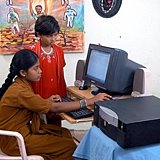
Otellini et al. announced this time that they're going to create a "Community PC" for rural areas in India. This one is expected to come from local manufacturers HCL and Wipro on the subcontinent and is targeting a street value of about $550.
The Community PC is intended as exactly that: a shared desktop box that can serve as its' own little internet cafe, apparently, and will run on 12v car batteries or regular juice, in addition to sporting a ruggedized case that will protect it from harm if Parminder spills his latte.
Not to be confused with the more personal Edu-Wise model announced in Brazil, the Community PC is expected to launch any day now. Intel didn't talk about how/whether the Community PC will be wired or unwired to connect to the Internets, but one would presume that unless there's a whole lotta word processin' goin' on in Agra, the machines will be hooked up with the worldwide webness. Just how that will be accomplished in the impoverished and presumably remote rural areas of India remains to be seen. Read the full post here ...

Otellini et al. announced this time that they're going to create a "Community PC" for rural areas in India. This one is expected to come from local manufacturers HCL and Wipro on the subcontinent and is targeting a street value of about $550.
The Community PC is intended as exactly that: a shared desktop box that can serve as its' own little internet cafe, apparently, and will run on 12v car batteries or regular juice, in addition to sporting a ruggedized case that will protect it from harm if Parminder spills his latte.
Not to be confused with the more personal Edu-Wise model announced in Brazil, the Community PC is expected to launch any day now. Intel didn't talk about how/whether the Community PC will be wired or unwired to connect to the Internets, but one would presume that unless there's a whole lotta word processin' goin' on in Agra, the machines will be hooked up with the worldwide webness. Just how that will be accomplished in the impoverished and presumably remote rural areas of India remains to be seen. Read the full post here ...
Monday, May 01, 2006
No Price Range Left Behind
From a post (here) at Engadget, comes a new twist in the unfolding saga of the affordable school computer. Last month, Intel announced their new Edu-Wise, a $400 little number destined for schools ... well ... someplace. The goal, according to Intel's Paul Otellini, is to put "real" computers in the hands of students.
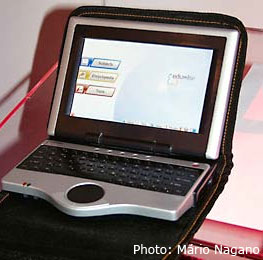
The announcement came in Sao Paolo, Brazil, so it's possible that Otellini's plan is to target more industrialized markets rather than go head-to-head with Nicholas Negroponte's hand-cranked OLPC project in the poorest nations of the world.
Otellini's presentation was short on specs and long on potential, and it's worth noting that his announcement came at roughly the same time that Intel was unveiling a series of smaller tablet-esque ultra-mobile PCs (UMPC) that were expected to come in at around the $500 range. Since the hype has settled a bit, it's also worth noting that most UMPCs that have actually become real products instead of pre-production prototypes are falling in the $1,000 - $1,500 range. (Doesn't say much for Otellini's $400 target for the Edu-Wise, does it?)
Still, this is another player in the mix, along with OLPC and Chairman Gates's yet-to-be-implemented handheld phone-based concept for educational computing in the developing world. And as we all know, the more players there are, the better it is for the consumers in the end. This may not turn into a dogfight of competing standards, as there's a great deal of performance disparity between OLPC and Edu-Wise (for now). But props all around for a bunch of rich guys who are looking for ways to put some pc power in the hands of the world's students. With a range of models and price points from which to choose, it's all good, really. Read the full post here ...

The announcement came in Sao Paolo, Brazil, so it's possible that Otellini's plan is to target more industrialized markets rather than go head-to-head with Nicholas Negroponte's hand-cranked OLPC project in the poorest nations of the world.
Otellini's presentation was short on specs and long on potential, and it's worth noting that his announcement came at roughly the same time that Intel was unveiling a series of smaller tablet-esque ultra-mobile PCs (UMPC) that were expected to come in at around the $500 range. Since the hype has settled a bit, it's also worth noting that most UMPCs that have actually become real products instead of pre-production prototypes are falling in the $1,000 - $1,500 range. (Doesn't say much for Otellini's $400 target for the Edu-Wise, does it?)
Still, this is another player in the mix, along with OLPC and Chairman Gates's yet-to-be-implemented handheld phone-based concept for educational computing in the developing world. And as we all know, the more players there are, the better it is for the consumers in the end. This may not turn into a dogfight of competing standards, as there's a great deal of performance disparity between OLPC and Edu-Wise (for now). But props all around for a bunch of rich guys who are looking for ways to put some pc power in the hands of the world's students. With a range of models and price points from which to choose, it's all good, really. Read the full post here ...
Overdue Books
Schools struggle and strain to meet budgetary restraints every day, so it should come as no surprise that some fall behind in updating certain educational materials, right? Well according to a story published in mid-April by the Chicago Tribune (here), schools are failing to supply what they called "the most basic tool of learning: a current book in good condition."

Seems they did a survey of 50 schools-- so let's not holla 'bout statistical relevance here-- and found that 80% of those schools had textbooks in use that were more than eight (8) years old.
For you home-gamers, it's worth noting that most textbooks operate on a five-to-six-year revision cycle.
In other words, it's conceivable that students are schlepping social studies stacks that don't know the outcome of the 2000 election (which doesn't explain why so many adults don't know it, either, but still ...). We hear constantly about a "pre-nine-eleven world" and a "post-nine-eleven-world," but we're using pre-nine-eleven books? Biology texts that don't know about cloning or stem cell research? Math texts that ... well, OK, the new math isn't that new and two plus two still equals five ... but come on.
When in the course of human events it becomes necessary to save a few bucks, is this really the right way to do it? Consider the fact that textbooks and similar educational materials (workbooks, homework sheets, manipulatives, maps, globes, etc.) typically account for a national average of about five or six percent of a school's budget, and one must wonder ... is this the right place to save money? In other words, if you went a whole year without buying ANY materials at all, you'd save about 5% of your budget. That's barely enough to "move the needle," as my boss's boss's boss might say.
Sure, there may be perfectly good textbooks whose content doesn't age, evergreen subjects where the life cycle of the book is determined more by the condition of the cover than the content. So students are lugging around six pounds of ragged, incomplete, defaced, and outdated textbook? The textbook publishing industry takes plenty of heat for "overpriced" books and "unnecessary" materials. But the whole industry only accounts for 6% of school spending. (And by the way, blame NASTA for the six-pound tome!) Educational publishers would LOVE to move out of color and paper and cardboard, producing lighter and less expensive black-and-white print materials that complement an online or CD-based "core text." But state committees and federal guidelines and this group and that consortium say "pshaw!" to that approach. Your kids schlep a newer version of the same product you used in gradeschool, and it's not because the publishing industry hasn't figured out a better way. It's because the educational system is largely the same as it was when you went to school.
Don't even get me started.
But back to the Trib story-- they claim that 22% of their surveyed schools are using materials that are more than fifteen (15) years old. Fifteen. A DECADE-AND-A-HALF. Of course, in that social studies book, the president is still George Bush. And there's still a reference to war with Iraq.
Is it time to show up at the local school board meeting, ya think? Maybe ask your kid's principal when they're ordering new books? Here's a hint: take a look at your kid's textbooks. The copyright page is the one on the back of the title page. Look at the copyright date. Subtract at least one year, because books are published a year ahead of their copyright year (books coming out now are copyright 2007). If the copyright is earlier than about 2001, it's time to update.
Fifteen years. Sheesh! Fifteen years, indeed! Read the full post here ...

Seems they did a survey of 50 schools-- so let's not holla 'bout statistical relevance here-- and found that 80% of those schools had textbooks in use that were more than eight (8) years old.
For you home-gamers, it's worth noting that most textbooks operate on a five-to-six-year revision cycle.
In other words, it's conceivable that students are schlepping social studies stacks that don't know the outcome of the 2000 election (which doesn't explain why so many adults don't know it, either, but still ...). We hear constantly about a "pre-nine-eleven world" and a "post-nine-eleven-world," but we're using pre-nine-eleven books? Biology texts that don't know about cloning or stem cell research? Math texts that ... well, OK, the new math isn't that new and two plus two still equals five ... but come on.
When in the course of human events it becomes necessary to save a few bucks, is this really the right way to do it? Consider the fact that textbooks and similar educational materials (workbooks, homework sheets, manipulatives, maps, globes, etc.) typically account for a national average of about five or six percent of a school's budget, and one must wonder ... is this the right place to save money? In other words, if you went a whole year without buying ANY materials at all, you'd save about 5% of your budget. That's barely enough to "move the needle," as my boss's boss's boss might say.
Sure, there may be perfectly good textbooks whose content doesn't age, evergreen subjects where the life cycle of the book is determined more by the condition of the cover than the content. So students are lugging around six pounds of ragged, incomplete, defaced, and outdated textbook? The textbook publishing industry takes plenty of heat for "overpriced" books and "unnecessary" materials. But the whole industry only accounts for 6% of school spending. (And by the way, blame NASTA for the six-pound tome!) Educational publishers would LOVE to move out of color and paper and cardboard, producing lighter and less expensive black-and-white print materials that complement an online or CD-based "core text." But state committees and federal guidelines and this group and that consortium say "pshaw!" to that approach. Your kids schlep a newer version of the same product you used in gradeschool, and it's not because the publishing industry hasn't figured out a better way. It's because the educational system is largely the same as it was when you went to school.
Don't even get me started.
But back to the Trib story-- they claim that 22% of their surveyed schools are using materials that are more than fifteen (15) years old. Fifteen. A DECADE-AND-A-HALF. Of course, in that social studies book, the president is still George Bush. And there's still a reference to war with Iraq.
Is it time to show up at the local school board meeting, ya think? Maybe ask your kid's principal when they're ordering new books? Here's a hint: take a look at your kid's textbooks. The copyright page is the one on the back of the title page. Look at the copyright date. Subtract at least one year, because books are published a year ahead of their copyright year (books coming out now are copyright 2007). If the copyright is earlier than about 2001, it's time to update.
Fifteen years. Sheesh! Fifteen years, indeed! Read the full post here ...
Blue Devils Have Less to Cheer About
Ah, remember the heady days of old, when you showed up on campus for your orientation and got the little care package? School spirit pencil and notepad ... check. Campus map ... check. Promotional info from the bookstore ... check. iPod ... wait, huh?

Yes, that's right, kiddies. The edge-cutters at Duke have dismantled the no-child-left-unipodded program. Seems after a year of handing out iPods to the inbound frosh crop, the Blue Devils' bursar has deemed the program prohibitively expensive (story here at Inside Higher Ed). Duke will no longer give an iPod to incoming freshmen, but they will loan you one. Students enrolled in courses participating in Duke's iPod initiative will have the opportunity to borrow an iPod for the semester or full year (depending on the course). There's probably some kind of security deposit involved, and let's hope Dukesters know better than to loan out the all-too-easily-marred nano, but there are no more freebies. Sorry kids. Suddenly that alternative at NC State maybe looks a little better, no? But if Devils fans have a little less about which to be wild, they should be sure to look for that $400 reduction in tuition, though, mmkay? Read the full post here ...

Yes, that's right, kiddies. The edge-cutters at Duke have dismantled the no-child-left-unipodded program. Seems after a year of handing out iPods to the inbound frosh crop, the Blue Devils' bursar has deemed the program prohibitively expensive (story here at Inside Higher Ed). Duke will no longer give an iPod to incoming freshmen, but they will loan you one. Students enrolled in courses participating in Duke's iPod initiative will have the opportunity to borrow an iPod for the semester or full year (depending on the course). There's probably some kind of security deposit involved, and let's hope Dukesters know better than to loan out the all-too-easily-marred nano, but there are no more freebies. Sorry kids. Suddenly that alternative at NC State maybe looks a little better, no? But if Devils fans have a little less about which to be wild, they should be sure to look for that $400 reduction in tuition, though, mmkay? Read the full post here ...
WTKSC Went Dark
OK, facts is facts: WTKSC went dark for a full month. Not intentionally, but because a bunch of real-world issues crowded out all of the "free" time required to maintain a blog like this one with meaningful posts.
The blackout, hopefully, has ended, though it is likely that multi-post days are a thing of the past ... or perhaps one or two multi-post days scattered through the week with a few days of relative silence will ensue.
At any rate, stop back here often and check to see whether WTKSC has managed to revive itself after a month-long hiatus. Thanks for reading. Hey ... now that we're back online, why not check out some of the older posts (there are several evergreens in there) and PASS ALONG the blog to friends, co-workers, loved ones ... . It would be really nice to see some traffic pick up again now that the dry spell is over. Thanks! Read the full post here ...
The blackout, hopefully, has ended, though it is likely that multi-post days are a thing of the past ... or perhaps one or two multi-post days scattered through the week with a few days of relative silence will ensue.
At any rate, stop back here often and check to see whether WTKSC has managed to revive itself after a month-long hiatus. Thanks for reading. Hey ... now that we're back online, why not check out some of the older posts (there are several evergreens in there) and PASS ALONG the blog to friends, co-workers, loved ones ... . It would be really nice to see some traffic pick up again now that the dry spell is over. Thanks! Read the full post here ...
Friday, March 31, 2006
Not Cool: Untimely Updates to an Event
OK, sure: the last post here promised some info from FETC. Well, our bad, but frankly time kept ticking away while other priorities begged for attention to make up for the absence caused by attending said event. Long and short of it is, there are other places to get FETC news, and those are your best bets.
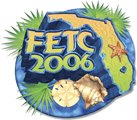
Apple is podcasting many of the keynotes and some of the session speakers. Find these here, and peruse what you missed.
In addition, eSchool News (here) has a fair amount of coverage; they sent a couple of correspondents to the show and while you may have to dig around their site a little, this should be a good jumping-off point for more news about FETC.
Finally, a bit of editorializing: Compared to the last FETC we attended, in 2001, this show was a great deal smaller in scale (exhibits and sessions) and the sessions seemed to be much more focused on specific local districts/state policies that were relatively narrow in perspective, whereas in days of yore the sessions tended toward a broader strategic scope. For example, a session on one-to-one computing focused exclusively on one district's experience (Broward) but never really brought up the more global issues involved. The "tactical" information was helpful, but the "strategic" information was left to the deduction of the attendees.
In short, FETC was a good experience. Not a great one, not a bad one; not a waste of time, but not necessarily a vision- or life-altering experience, either. It was cool, but it didn't rock out to the extent of previous shows. Read the full post here ...

Apple is podcasting many of the keynotes and some of the session speakers. Find these here, and peruse what you missed.
In addition, eSchool News (here) has a fair amount of coverage; they sent a couple of correspondents to the show and while you may have to dig around their site a little, this should be a good jumping-off point for more news about FETC.
Finally, a bit of editorializing: Compared to the last FETC we attended, in 2001, this show was a great deal smaller in scale (exhibits and sessions) and the sessions seemed to be much more focused on specific local districts/state policies that were relatively narrow in perspective, whereas in days of yore the sessions tended toward a broader strategic scope. For example, a session on one-to-one computing focused exclusively on one district's experience (Broward) but never really brought up the more global issues involved. The "tactical" information was helpful, but the "strategic" information was left to the deduction of the attendees.
In short, FETC was a good experience. Not a great one, not a bad one; not a waste of time, but not necessarily a vision- or life-altering experience, either. It was cool, but it didn't rock out to the extent of previous shows. Read the full post here ...
Thursday, March 23, 2006
Coming Soon: Notes from FETC
Over the next few days, WTKSC will be posting a few items that sum up some of the goings-on at FETC, the Florida Educational Technology Conference. While these won't serve as real-time news item posts, they'll focus on capturing the essence of some of the concurrent sessions and exhibitors' presentations for the geographically challenged folks who couldn't get to FETC their own selves.
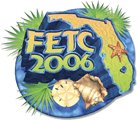
Please note: WTKSC isn't big enough to offer comprehensive coverage of a conference this size. Although smaller than in years past, FETC is still a sizeable and well-attended event and covers more ground than one pair of shoes can manage in a day and a half. You'll have to settle for highlights.
Check back here starting Friday for a gradual release of posts, hacked out as expeditiously as a part-time effort can afford. Oh-- if you're attending FETC and want to contribute, please FEEL FREE to do so either by e-mail or via comments to the posts. WTKSC would be thrilled to have some additional perspectives on the show. Read the full post here ...

Please note: WTKSC isn't big enough to offer comprehensive coverage of a conference this size. Although smaller than in years past, FETC is still a sizeable and well-attended event and covers more ground than one pair of shoes can manage in a day and a half. You'll have to settle for highlights.
Check back here starting Friday for a gradual release of posts, hacked out as expeditiously as a part-time effort can afford. Oh-- if you're attending FETC and want to contribute, please FEEL FREE to do so either by e-mail or via comments to the posts. WTKSC would be thrilled to have some additional perspectives on the show. Read the full post here ...
Wednesday, March 22, 2006
Law Versus Lapsters
File this under "Luddite:" A professor of law at the University of Memphis has banned laptops from her class, claiming they create a "picket fence" between student and teacher. According to the Associated Press (here), she sent an e-mail to her students at the beginning of the semester advising students to pack paper and pencil for her lectures, citing the "distraction" caused by lappies. Apparently, June Entman feels that U of Memphis Tigers who use lapsters focus on transcribing her lectures, rather than applying any sort of critical thinking.

Presumably, the professor doesn't post her lecture notes, PowerPoint slides, or (gasp) a podcast of her lectures, either. Because, really, students should be focused on doodling, paper airplanes, or passing notes, and not on capturing any of the information digitally. Maybe she should advocate stone as the preferred note-taking medium, given its' durability advantage over papyrus.
On the off chance that Professor June F. Entman, faculty member at the University of Memphis since 1984, actually checks her e-mail, some of the more vocal students of "Generation i" might want to appeal her decision. Apparently they tried lobbying for a summary ruling by the Law Department, to no avail. Perhaps personal appeals would have more effect. Assuming the good Professor checks her e-mail. Go Tigers! (And props to Manchester [IN] Community Schools for the perfect clip art.) Read the full post here ...

Presumably, the professor doesn't post her lecture notes, PowerPoint slides, or (gasp) a podcast of her lectures, either. Because, really, students should be focused on doodling, paper airplanes, or passing notes, and not on capturing any of the information digitally. Maybe she should advocate stone as the preferred note-taking medium, given its' durability advantage over papyrus.
On the off chance that Professor June F. Entman, faculty member at the University of Memphis since 1984, actually checks her e-mail, some of the more vocal students of "Generation i" might want to appeal her decision. Apparently they tried lobbying for a summary ruling by the Law Department, to no avail. Perhaps personal appeals would have more effect. Assuming the good Professor checks her e-mail. Go Tigers! (And props to Manchester [IN] Community Schools for the perfect clip art.) Read the full post here ...
Monday, March 20, 2006
E-Ink Bound for Bookbags?
Remember the heady days of the dot-com bubble? When everything everywhere was "going digital," and the internets were going to revolutionize everything from commerce to pudding? Well, it's time to dust off one of the "also ran" technologies that made to the list of things that didn't make the big time: eBook readers. (Or E-Book readers, or e-book readers, or some other iteration blending a creative use of cApitalization or hy-phen-ation or lackofspace.)

Seems iRex, a European technology concern, has finally released details on the iLiad eBook reader they announced last fall. Sadly, the device fails to "revolutionize" much of anything, although the specs and form factor are a marked improvement over the technology of 1999. (Thinner. Lighter. More memory. Touch-screen interface. Longer battery life.) The only thing this eBook (iRex's spelling) reader has that wasn't around a few years back is e-ink, which is largely responsible for the extended battery life.
e-ink is a technology that only consumes power when it changes the image displayed. It uses bi-lobal crystals a la LCD technology but in a solid-state form that allows the display to hold its' image without consuming battery juice. You only use power when you re-draw the screen.
(Click the link to read the rest of this post ...)
Sadly, the iLiad doesn't pack much more of a punch. It reads PDF files, XHTML, raw text, and will play mp3's. Given the fact that Adobe is pulling the plug on DRM technology for the PDF format (2007), the likelihood of seeing visually appealing monochromatic pages on iLiad isn't high. Publishers, in their relentless pursuit of filthy lucre, are going to want some assurance that the first eBook copy they sell won't also be the last.
Sony, a brand with just a mite more muscle than iRex, also recently announced an eBook reader. Their boasts PDF compatibility, but ups the ante with an online bookstore boasting 10,000 titles at launch (any day now) and a proprietary (and ostensibly secure) file format called BBeB (BroadBand eBook). Sony's unit will reportedly sell in the $300 to $400 range, while iLiad is purported to run (yikes!) a whopping 650 Euros, which is more than $800 US (or else it's 39 degrees; we always get those celsius/metric conversions messed up).
With price points that high, Johnny won't be loading one of these full of his textbooks any time soon. But the technology has gotten better, and usability is coming into line with expectations. If it's just a question of cost, Moore's Law should render these at a more accessible price point within 18 months to 2 years. It might be too late to help the Class of 2006, but maybe by the time the Class of 2010 rolls around, students will be schlepping e-ink and spare batteries rather than textbooks and notebooks. By that time, tablet interfaces will be more common and elegant (witness Micro$oft's push of Origami), batteries will have more life in less weight, and e-ink may be ready for color.
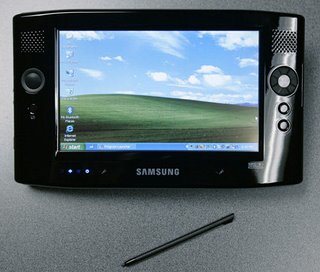
But speaking of Origami, why would someone shell out $400 for an eBook reader when they can get a full-on tablet portable running Windows for one more Benjamin? Origami promises multimedia capability, real computing power, wireless connectivity, Bluetooth, and color. And yeah, it'll open a PDF file, too. Devices will come from several hardware playas, meaning competition and downward price pressure. These, too, will be subject to Moore's Law (which states that computing power doubles and prices split in half about every 18 months). And with Nicholas Negroponte's OLPC project, who knows? Maybe a hand-cranked version for the US market will bring computers to students for half the current going rate.
No matter how it shakes out, though, it's coming. Call it one-to-one computing or an eBook revolution or OLPC or Origami, the stars are aligning in the constellation Technologus, and students in schools around the world will soon be able to learn like never before. Cool, huh?
Read the full post here ...

Seems iRex, a European technology concern, has finally released details on the iLiad eBook reader they announced last fall. Sadly, the device fails to "revolutionize" much of anything, although the specs and form factor are a marked improvement over the technology of 1999. (Thinner. Lighter. More memory. Touch-screen interface. Longer battery life.) The only thing this eBook (iRex's spelling) reader has that wasn't around a few years back is e-ink, which is largely responsible for the extended battery life.
e-ink is a technology that only consumes power when it changes the image displayed. It uses bi-lobal crystals a la LCD technology but in a solid-state form that allows the display to hold its' image without consuming battery juice. You only use power when you re-draw the screen.
(Click the link to read the rest of this post ...)
Sadly, the iLiad doesn't pack much more of a punch. It reads PDF files, XHTML, raw text, and will play mp3's. Given the fact that Adobe is pulling the plug on DRM technology for the PDF format (2007), the likelihood of seeing visually appealing monochromatic pages on iLiad isn't high. Publishers, in their relentless pursuit of filthy lucre, are going to want some assurance that the first eBook copy they sell won't also be the last.
Sony, a brand with just a mite more muscle than iRex, also recently announced an eBook reader. Their boasts PDF compatibility, but ups the ante with an online bookstore boasting 10,000 titles at launch (any day now) and a proprietary (and ostensibly secure) file format called BBeB (BroadBand eBook). Sony's unit will reportedly sell in the $300 to $400 range, while iLiad is purported to run (yikes!) a whopping 650 Euros, which is more than $800 US (or else it's 39 degrees; we always get those celsius/metric conversions messed up).
With price points that high, Johnny won't be loading one of these full of his textbooks any time soon. But the technology has gotten better, and usability is coming into line with expectations. If it's just a question of cost, Moore's Law should render these at a more accessible price point within 18 months to 2 years. It might be too late to help the Class of 2006, but maybe by the time the Class of 2010 rolls around, students will be schlepping e-ink and spare batteries rather than textbooks and notebooks. By that time, tablet interfaces will be more common and elegant (witness Micro$oft's push of Origami), batteries will have more life in less weight, and e-ink may be ready for color.

But speaking of Origami, why would someone shell out $400 for an eBook reader when they can get a full-on tablet portable running Windows for one more Benjamin? Origami promises multimedia capability, real computing power, wireless connectivity, Bluetooth, and color. And yeah, it'll open a PDF file, too. Devices will come from several hardware playas, meaning competition and downward price pressure. These, too, will be subject to Moore's Law (which states that computing power doubles and prices split in half about every 18 months). And with Nicholas Negroponte's OLPC project, who knows? Maybe a hand-cranked version for the US market will bring computers to students for half the current going rate.
No matter how it shakes out, though, it's coming. Call it one-to-one computing or an eBook revolution or OLPC or Origami, the stars are aligning in the constellation Technologus, and students in schools around the world will soon be able to learn like never before. Cool, huh?
Read the full post here ...
Federal Judge Reads WTSC ... ?
Want to know something cool? The federal judge presiding over the DOJ/Google suit, US District Judge James Ware, must be reading this blog, and specifically, the post about the case. Witness his ruling, handed down late Friday, in the case.

Ware did not force Google to give up search data that could encroach on user privacy. Instead, the judge decided that Google would hand over 50,000 websites that have been "crawled" (or indexed) by the search giant's systems.
In an attempt to ameliorate privacy concerns, DOJ had altered their original request. Rather than a full week's worth of search terms and results, the plaintiffs sought just 5,000. Instead, the judge decided to block the government from gaining access to search terms, and instead ordered Google to hand over records that should serve the DOJ's original intent ... which is to gain a statistical understanding of the frequency with which adult content sites are returned in ostensibly innocuous searches.
This is a win-win-win solution, whereby DOJ can pursue its' aim to shield users from unsolicited pr0n content, Google can claim victory in the never-ending debate over user privacy, and consumers and their search terms remain anonymous to the government. Judge Ware's ruling establishes a solid precedent in favor of privacy, and everyone walks away happy. Clearly Ware was moved to careful consideration after reading the earlier post on this topic in WTKSC. Cool, huh? Read the full post here ...

Ware did not force Google to give up search data that could encroach on user privacy. Instead, the judge decided that Google would hand over 50,000 websites that have been "crawled" (or indexed) by the search giant's systems.
In an attempt to ameliorate privacy concerns, DOJ had altered their original request. Rather than a full week's worth of search terms and results, the plaintiffs sought just 5,000. Instead, the judge decided to block the government from gaining access to search terms, and instead ordered Google to hand over records that should serve the DOJ's original intent ... which is to gain a statistical understanding of the frequency with which adult content sites are returned in ostensibly innocuous searches.
This is a win-win-win solution, whereby DOJ can pursue its' aim to shield users from unsolicited pr0n content, Google can claim victory in the never-ending debate over user privacy, and consumers and their search terms remain anonymous to the government. Judge Ware's ruling establishes a solid precedent in favor of privacy, and everyone walks away happy. Clearly Ware was moved to careful consideration after reading the earlier post on this topic in WTKSC. Cool, huh? Read the full post here ...
Thursday, March 16, 2006
Oh, SNAP! Gates Disses OLPC?!
Well, William H. Gates III, who is at the top of the Forbes list as the richest person in the world, did a little trash talkin'. Seems he was giving this talk at the M$ Government Leaders Forum, an annual shindig in D.C., and he completely dissed the OLPC project. He didn't name Nicholas Negroponte by name, and he didn't exactly come out and say "the One Laptop Per Child" computer. But there was no doubt what he was talking about. In fact, his remarks sparked the following headline on the popular blog Good Morning Silicon Valley: "Hey Melinda, what do you call a crank on a computer? 'Nicholas Negroponte!'" (Their post, here, like their blog in general, is well worth a read.)

Said His Gatesness: "The last thing you want to do for a shared use computer is have it be something without a disk ... and with a tiny little screen." It's worth noting that Gates was in the middle of a plug for Origami, which is not so much a specific product as a "new" (yeah ...) line of small tablet-interfaced computers (think Newton or smart phone on the Barry Bonds regimen of dietary supplements). So, sure, Billy's gotta pump up da jam on the whole Windows thang. But he just reached right out and bit*#-slapped the OLPC project.
(To continue, click the link below ...)
Not content with subtlety, Gates went on. "If you are going to go have people share the computer, get a broadband connection and have somebody there who can help support the user, geez, get a decent computer where you can actually read the text and you're not sitting there cranking the thing while you're trying to type."
So, Bill, to be clear: you're not a fan? Oh, wait, we get it: Origami is the way to go ... those $600 wonders will fly far in the Third World. Hey, while you're at it, they probably ought to eschew the whole Open Source thing and shell out a couple extra bills for M$ Office, right? And probably put a nice big Novell server in the school, too, right? Because if you're going to hook up the people who are technologically underserved, ya gotta do it right. We're talking about places in the world where the Junta Du Jour can't afford a ThinkPad, n'est-ce pas? And Origami is the solution for the masses?
And the Bill and Melinda Gates Foundation, for whose work you shared Time's Persons of the Year honor, is going to front the price of entry? Gates can stick with XBox 360 and XBox live, and shrinkwrapped solutions that will serve the relatively well-heeled. That's fine. But unless he's going to roll Origami out to the needy at a $100 price-point, he oughta keep his mouth shut.
Note to Mr. Negroponte: Keep crankin', bro. Putting connectivity-- affordable, durable, accessible, connectivity-- into the hands of the developing world isn't any less sexy just because Microsoft's founder doesn't dig your plan. You go, boy. Crank it up, crank it out, and hook up the, uh, hookless. That's very cool.
Read the full post here ...

Said His Gatesness: "The last thing you want to do for a shared use computer is have it be something without a disk ... and with a tiny little screen." It's worth noting that Gates was in the middle of a plug for Origami, which is not so much a specific product as a "new" (yeah ...) line of small tablet-interfaced computers (think Newton or smart phone on the Barry Bonds regimen of dietary supplements). So, sure, Billy's gotta pump up da jam on the whole Windows thang. But he just reached right out and bit*#-slapped the OLPC project.
(To continue, click the link below ...)
Not content with subtlety, Gates went on. "If you are going to go have people share the computer, get a broadband connection and have somebody there who can help support the user, geez, get a decent computer where you can actually read the text and you're not sitting there cranking the thing while you're trying to type."
So, Bill, to be clear: you're not a fan? Oh, wait, we get it: Origami is the way to go ... those $600 wonders will fly far in the Third World. Hey, while you're at it, they probably ought to eschew the whole Open Source thing and shell out a couple extra bills for M$ Office, right? And probably put a nice big Novell server in the school, too, right? Because if you're going to hook up the people who are technologically underserved, ya gotta do it right. We're talking about places in the world where the Junta Du Jour can't afford a ThinkPad, n'est-ce pas? And Origami is the solution for the masses?
And the Bill and Melinda Gates Foundation, for whose work you shared Time's Persons of the Year honor, is going to front the price of entry? Gates can stick with XBox 360 and XBox live, and shrinkwrapped solutions that will serve the relatively well-heeled. That's fine. But unless he's going to roll Origami out to the needy at a $100 price-point, he oughta keep his mouth shut.
Note to Mr. Negroponte: Keep crankin', bro. Putting connectivity-- affordable, durable, accessible, connectivity-- into the hands of the developing world isn't any less sexy just because Microsoft's founder doesn't dig your plan. You go, boy. Crank it up, crank it out, and hook up the, uh, hookless. That's very cool.
Read the full post here ...